Tim Waggoner's Blog, page 2
March 24, 2025
Tiny Words
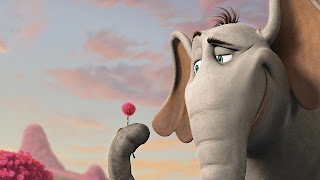
Missme?
It’s beena while since my last blog entry (and newsletter and YouTube video). Aside fromteaching Spring semester classes at my college, I was desperately trying tocatch up on various writing projects. I still have a couple books – onefiction, one nonfiction – and a few short stories I need to finish, but atleast my head’s (slightly) above water again. Plus, the spreading infection of fascismin my country has caused my persistent depressive disorder (also known asdysthymia) to kick into high gear again. So far, I’ve managed to avoid fallinginto a major depression, but I haven’t had the mental energy for anything extra,which meant my blog, newsletter, and video channel went by the wayside. They allfocus on writing, and while I use them as promotional tools for my work, mymain goal is to help writers, just as I’ve been helped by so many over theforty years of my career. I tried to come up with ideas, but none of themappealed to me. Besides, what was the point? In the face of what’s happening inAmerica right now – and how much worse it might get – what good could my essaysand videos about writing do? Once, I was writing while extremelysleep-deprived, and I kept nodding off in front of my computer. During one ofthese times, I heard a voice whisper in my mind. (Don’t worry, this kind ofthing doesn’t happen to me on a regular basis.) It said Your words are tinywords. I was startled awake, and I knew instantly that when the voice said tinyit meant inconsequential and worthless. Words that didn’t have even the mostminimal impact on the world, words which might as well never have been writtenat all.
I didn’ttake the voice seriously. As I always say to writing students when talkingabout self-doubt, “Remember, those voices always lie.” And writers that don’tfind some way to keep going despite their doubts aren’t going to last long inthis game. But over the last few months I’ve been feeling that my words really aretiny, at least compared to the march of totalitarianism in the USA – and I knowI’m not the only one.
Gettingolder isn’t helping, either. I turned sixty-one a couple weeks ago, and awriter friend of mine, Brady Allen, died unexpectedly on my birthday. He wassix years younger than me, taught composition and creative writing at a localuniversity, and was the father of two daughters. He wrote horror fiction, too,among other genres. So we had writing and teaching career in common, as well asboth of us having two daughters and a love of horror fiction.
Here’s alink to Brady’s Amazon page, where you can find out more about him and orderhis short story collection Back Roads and Frontal Lobes: https://tinyurl.com/nhc94hjv
In lateDecember, a good friend from college, Brad Marcum, passed away after a longbattle with early onset dementia, and another college friend, Paul Custodio,also died recently. At the first Stokercon in Las Vegas in 2016, I was talkingwith author William F. Nolan at dinner one evening. Bill was in his nineties,and he said, “The hard thing about living so long is everyone I grew up with isgone.” Bill died in 2021. Dennis Etchison (one of my favorite authors of alltime) was with us at that dinner, and he died in 2019.
Here's anews article about Brad: https://www.news-expressky.com/sports/remembering-brad-marcum/article_ef0dd644-c93c-11ef-a8f6-ffbc02d5776d.html
Here’s alink to Paul Custodio’s LinkedIn page: https://www.linkedin.com/in/paulcustodio/
Here are linksto Bill’s and Dennis’ Wikipedia pages:
https://en.wikipedia.org/wiki/William_F._Nolan
https://en.wikipedia.org/wiki/Dennis_Etchison
Given allof this, it’s only natural for someone (aka me) to wonder what the point of itall is. And by it, I don’t mean life. My first close relative died whenI was nine, and I almost drowned the same year. I’ve had fifty-two years tocome to terms with the reality that our lives are finite. I mean the point of awriting career. In the face of all the darkness in the world, all of our wordscan seem pretty goddamned tiny. But our words matter, especially during darktimes.
So ifyou’re having trouble seeing the point of your writing, consider the following.
It’sOkay Not to Write
Writersoften feel guilty when they aren’t producing words. If you write to make aliving, there’s very real financial pressure to produce, of course, but most ofus probably have day jobs (I do), and our writing has little to no financialimpact on our overall income. And if it does, we can most likely get by withoutthat money. At this point in my career, I make decent money from my writing,enough to live on if I lived extremely modestly, but writing money ebbsand flows, so it can’t be relied on. Plus, I like teaching (even if I amlooking forward to retiring in a few years). But if I become overburdenedemotionally, I know it’s okay to take a break from writing (or slow down myrate of production), and I’d do my best not to feel guilty or surrender toself-loathing and begin thinking of myself as a failure. One of the things Ilearned when I became a parent was that if I don’t take care of myself, I can’ttake care of others. It’s like what flight attendants tell you about the oxygenmasks. Put yours on before you try to help anyone put on theirs – because ifyou pass out, you can’t help anyone.
Your WritingKeeps You Sane
I need towrite like I need to breathe. Both my ex-wife and my current wife have told methat if I go several days without writing, I start to get moody, then cranky,then depressed. Writing is as important to my mental and physical health asexercise, good nutrition, and sleep. (Not that I get enough of those latterthree…) There’s an infinite number of things that I can’t control in thisuniverse, but I can control whether I write, and sometimes having even a smallthing in your life that you can control can help you make it through bad times.Creation, however modest it may be, is a positive thing. You’ve broughtsomething new into being and – whether you take this next bit literally or asmetaphor, it still works – you’ve added to the sum total of Light in theuniverse. Plus, just as reading allows people to escape their troubles for atime, so does writing help us escape ours.
YourWriting Helps Others Cope
Storiesare refuges for both those who make them and those who read them. Forty or soyears ago, my mom was scheduled to undergo surgery, and while my dad wasn’t thekind of man to display much emotion, I knew he was worried about her. The nightbefore mom’s procedure, Dad and I went to a small local bookstore. Theunwritten rule in my family was that anyone who bought a book got to be thefirst to read it. I can’t remember which book Dad bought, but I bought thefourth book in Piers Anthony’s Xanth series, Centaur Aisle. I’d had noidea there was a fourth book, so as a fan of Xanth, I was very excited to findit. As we paid for our books, Dad saw Centaur Aisle, and he asked if hecould read it first. I was shocked, since this Simply Was Not Done in myfamily. Then I realized Dad wanted to read the book because he needed a silly,imaginative adventure to occupy his mind while Mom was undergoing surgery. Ofcourse, I said yes. I understood that day that popular fiction could be muchmore than simple entertainment. It can be a lifeline for people in so manyways. I did something similar several years later when my first wife was in thehospital with complications for several days before our daughter was born. Iread the first few books in Jennifer Roberson’s Tiger and Del series to help mecope then. (I highly recommend those books).
Yourwriting can do the same for people. A Stephen King or Nora Roberts’ novel mighthelp millions cope, while a short story you publish in a small-press journalmight help only a few people. How many people we reach doesn’t matter. Helpingone is as good as helping many. The point is simply to help on whatever scalewe can, whenever we can.
Your WritingShows People They Aren’t Alone
Iexperienced a very dramatic example of this at the 2024 Stokercon inPittsburgh. I was scheduled to do a reading with two other authors. The ideabehind readings like this is that a more-experienced writer serves as a draw tobring in a larger audience for newer writers. Having done these kinds ofreadings many times, I know that while the authors should split the hourequally, newer writers almost always take up too much time. For this reason, Ialways go last, and I bring several pieces of flash fiction to read. That way,I can fill up whatever time I have left to me without stopping in the middle ofa story. Before I left for the con, I printed out several pieces of flashfiction, more or less at random, to read. It’s not standard practice, but Ilike to read a piece that I’ve never read in public before whenever I do areading, so one of the stories I chose was called “Faithful Friend andCompanion.” It had appeared in the late lamented Vastarian, and it was ashort, surreal story in which I processed the death of one of my beloveddachshunds. He was only seven years old when we had to put him down, and doingso devastated me.
So whenmy time came, I read “Faithful Friend and Companion” to a group of aroundfifteen people. Like an idiot, it neveroccurred to me that I should preface my reading with a content warning. One ofthe people in the audience had recently put down her dog, and the trauma wasstill very fresh for her. When I was finished, people clapped, and several saidhow impactful they found the story. Then the woman who’d just lost her dog toldus what she’d gone through not long ago, and I was filled with horror atunknowingly re-traumatizing her. She said if I’d given a content warning, shewould’ve left the room, and she didn’t realize where the story was going untilit was almost over (flash fiction, remember?) and she hadn’t felt comfortableleaving at that point. I apologized to her, but she said that while the storywas painful to listen to, it was a good experience. She said she could tellfrom the story that I had gone through the same thing – and I admitted I had –and then she said, “It helps to know that I’m not alone.” Anyone could tellsomeone else about having to put their dog to sleep, but as a writer, you canmake someone feel that you experienced the same emotions as they did.That creates a deep, powerful connection.
YourWriting is Your Voice
There aregood reasons dictators fear writers and other artists. One is what I talkedabout in the previous paragraph. Using our voice as artists, we can make deepconnections to our audience through our work – connections that are out of adictator’s control. What’s more, our audience can connect to each other throughour work. We can speak directly or in metaphor and symbol. We can engender andstrengthen empathy. We can help people imagine possibilities, conceive of abetter world, believe they can become their best selves. Art is one of the mostpowerful forces humans have ever created, a weapon that ultimately cannot bestopped as long as our species endures. It absolutely terrifies thosewho, as XTC sings in the “Ballad of Peter Pumpkinhead,” “would keep us on ourknees.”
https://www.youtube.com/watch?v=pYupSHWEJxA
Maybe youdon’t feel your voice is loud enough on its own to do any good. But think aboutDr. Seuss’ Horton Hears a Who. The Whos were microscopically small, butwhen they combined every last one of their voices – their tiny voices –they were finally able to make themselves heard in the larger world. Horton’sline that he repeats throughout the story, “A person’s a person, no matter howsmall,” could just as easily have been “A voice is a voice, no matter howsmall.”
And eachand every one of them is important.
DEPARTMENTOF SHAMELESS SELF-PROMOTION
JustAdd Writer

My latesthow-to book is all about writing media tie-ins. It comes out from Raw DogScreaming Press in May 2025, and it’s available for preorder at the Raw Dogsite – and you get a discount if you preorder! How great is that? And ifyou’re a reviewer, the book is also available to request from NetGalley.
https://rawdogscreaming.com/books/just-add-writer/
Andspeaking of tie-ins…
TheX-Trilogy is Complete
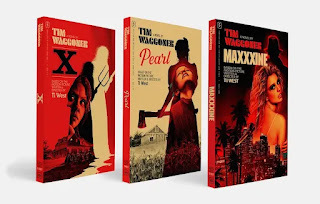
With therelease of MaXXXine in February, all three novelizations of Ti West’sX-Trilogy are out! The best place to buy the books is on the A24 Publishingwebsite, where you can purchase them individually or in a bundle.
Preorder,by Crom!
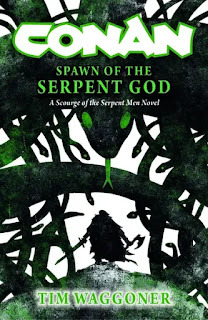
My novel Conan:Spawn of the Serpent God will be out in October 2025, but you can preorderit now! And you’d best be quick about it if you don’t want to make a certain Cimmerianangry.
https://titanbooks.com/72365-conan-spawn-of-the-serpent-god/
ScheduledAppearances
AuthorconV. March 28th to March 30th. Williamsburg, Virginia.
StokerCon.June 12th to June 15th. Stamford, Connecticut. I’m one of the guests of honor!
Signingat Vortex Books. June 26th, 5-7pm. Columbia, Pennsylvania.
Horror onMain. June 27th to June 29th. Harrisburg, Pennsylvania.
GenconWriters’ Symposium. July 31st to August 3rd. Indianapolis, Indiana.
SocialMedia
NewsletterSign-Up: https://timwaggoner.com/contact.htm
Website: www.timwaggoner.com
Blog: http://writinginthedarktw.blogspot.com/
YouTube Channel: https://www.youtube.com/c/timwaggonerswritinginthedark
Threads:@tim.waggoner.scribe@threads.net
Bluesky: @timwaggoner.bsky.socialFacebook:https://www.facebook.com/tim.waggoner.9
Instagram:tim.waggoner.scribe
January 5, 2025
Alone or Together: Are Writers' Organizations for You?
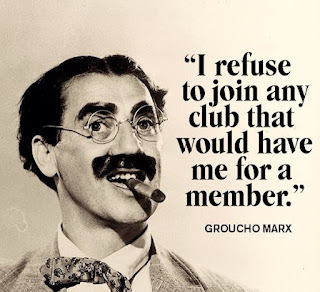
I’m a member of four writers’organizations: The Horror Writers Association, the Science Fiction and FantasyWriters Association, the International Association of Thriller Writers, and theInternational Association of Media Tie-In Writers. I’ve also been a member ofthe Association of Writers and Writing Programs and the Authors’ Guild,although I’m not currently a member of either.
Ijoined HWA and SFWA back in the early 1990s, and I’ve been a member of themboth ever since (with a short break after my divorce from my first wife whenmoney was beyond tight for a while). And in those thirty-plus years, I ‘ve seenpeople make the same basic arguments for and against writers’ organizationsover and over. So, for writers considering joining a writers’ organization, writerswho’ve never considered it, and writers who are a member of an organization andcontemplating leaving it, here are some points to consider. But before we getstarted…
Whetheryou belong to a writers’ org, never belonged, joined one, quit one, or anycombination during the course of your career, you should always do what feels rightfor you at any given time. I’m not here to criticize your choices, whateverthey might be.
DoYou Need to Belong to a Writers’ Organization?
No.The only thing you need to do to be a professional writer is write a lot, workon improving your writing, and get your writing into readers’ hands, whetheryou’re traditionally published or indie.
CanBelonging to a Writers’ Organization Benefit You?
Sure.But there isn’t much an organization can do for you that you can’t do foryourself one way or another. You can find information on writing techniques,traditional publishing, self-publishing, submission calls, promotion techniques,professional etiquette, and more via the internet or social media. You can alsofind a writing community and mentors online.
Buthere’s the thing. You have to do the work to find this information and connect withthese people. If you belonged to a writers’ organization, it could be yourgateway to this info. One of the principles I teach my students in Essay andResearch classes is Get Someone to Do the Work for You. I don’t mean cheat. Imean research smarter, not harder. For example, if a student is writing aboutthe effects of secondhand smoke, I tell them to hit Wikipedia first. Wikipediausers have done the work of creating a comprehensive, easy-to-read overview onthe subject, and other users, as well as Wikipedia employees, check thatinformation. I tell students not to use Wikipedia itself for research (sincemost people don’t consider it to be a reliable source), but it can get you upto speed on a topic quickly, help you generate a list of key search terms youcan use later, and there will be a bibliography with links at the end of anentry that could lead to possible sources for you. For this topic, I would alsotell students to visit websites for various health organizations, such as theAmerican Lung Association, the American Cancer Society, the Centers for DiseaseControl and Prevention, and the World Health Organization. These orgs have donethe work of hiring experts in their fields and gathering reliable up-to-dateinformation. I also tell students to add the words links, resources,and list of sources to their Google searches. So, “secondhand smokelinks,” “secondhand smoke resources,” etc. This way, they’ll hopefully find sitesthat collate links to a number of other sites, saving them valuableresearch time. I also urge them to use the college library’s databases wherecurated articles are available, so they don’t have to waste time sloggingthrough the tons of crap on the internet to find good sources.
Writers’organizations can help you build your career in ways that are smarter, notharder. I say can because not all orgs are equal, and they can changefor the better or worse over time. And your needs may change throughout yourcareer, and the advice and resources you needed when you were starting out maynot what you need today.
If you want toknow whether a particular organization might be right for you right now,check three things:
· Whatthe org says about itself (its mission statement, what services what it offers,etc.)
· Whatorg proponents have to say about it.
· Whatorg critics have to say about it. (And make sure the critics actually haveexperience with the org they’re criticizing.)
You’ll need to decide for yourself whichof this info is true, which is kinda-sorta true, and which is bullshit, thendecide whether or not to join. Or you could just join for a year and see whatyou think. But if you do join an organization…
It’s Up to You to Make the Most of YourMembership
This is where you do need to do some workbecause no one can do it for you. Whatever information and services the organizationprovides, you need to know what they are, and you need to take advantage ofthem. I can’t tell you how many times over the years I’ve seen people join awriters’ org for a year, do nothing with the org, then say they’re quittingbecause they got nothing out of their membership. I joined AARP a few years ago(I think I qualified at 55; I’m almost 61 now) because a student told me thatthere are all kinds of great discounts you can get with a membership. Do youknow what I got out of my membership? Nothing because I didn’t do a damn thingwith it. (Maybe I was determined not to use it because I was in denial aboutbeing old enough to qualify.) There was no problem with the organization itself.The problem was entirely with me. Or to put it another way, I wasn’t trulyinterested in the services the organization offered.
I think writers’ orgs (if they don’talready do this) should have a prominent “How to Make the Most of YourMembership” info page on their websites, and maybe a recurring feature of thesame name in their newsletters. And dividing this advice into differentsections for new writers and established writers would probably be helpful,too.
Dues
Thedues for writers’ organizations are/are not expensive depending on your currentfinancial situation. (Remember what I said about my post-divorce financesearlier?) If you can’t afford a membership, get together with a few writerfriends, pool your money, have one of you join, then share the information/services/benefitsas much as possible. Not only will it be cheaper, you’ll all get experiencewith an organization to decide if it’s one you want to stick with and eventuallyget individual memberships to. I don’t know if any writing organizations dothis, but I think they could offer a one-time three-month or six-month“try-it-out” period for a cheaper price to allow folks to see if an org is forthem without the expense or time commitment of a full-year membership.
Andyou know you can deduct professional organization dues from your taxes, right?
I’veheard older writers say writers’ orgs don’t do much for them at the currentstage of their careers. I wonder if reduced dues or even free memberships forseniors might be something that could counteract this feeling, at least alittle. It might be an effective way of keeping the hard-won experience andwisdom of older writers in organizations.
AreYou a Community-Seeker or a Go-It-Aloner?
Overthe decades, I’ve seen this dynamic play out hundreds of times. Some writersfind personal and professional satisfaction in being part of a group. Othersare inherently reluctant to be part of a group, and if they join one, theyconstantly look for reasons to get the hell out as soon as they can. There’snothing wrong with either of these attitudes, but it can save you a lot ofgrief to know what your inclination is before you join an org – or at leastknow you’re trying out an org even if you think in end it might not be for you.
Cliquesin Writers’ Orgs
Acriticism I sometime see about writers’ orgs is that there’s a small groupthat’s the in-crowd, and they’re primarily the ones who the organizationserves, the only ones the organization cares about. Often these “cliques” arecomprised of the people – either elected officers and/or volunteers – who worktogether to run the organization. They’re the most visible faces and most heardvoices in the organization, and it’s only natural they would work closelytogether and get to know each other well. They’re not cliques meant to excludeanyone.
Dramain Writers’ Orgs
Anothercriticism I see often is that writers’ orgs are full of drama, and a lot ofpeople want nothing to do with them because of it. Real and important issuesarise for organizations, but the drama comes from the instant online firestormof emotional reactions to them. It takes time for organizations to investigatea problem, figure out what’s happening, and then come up with an officialposition on it, and choose what action to take – and they may have legalconcerns with all these steps as well. And they have to try their best not topour gasoline on the firestorm and make it worse. Organizations aren’tspeedboats that can move quickly and alter course easily. They’re ocean liners,and they take a while to get moving and even longer to turn around and changecourse.
It'svital that members discuss any issues they think writers’ orgs should addressor any problems they see with the orgs themselves. They should contact the orgdirectly with concerns they have before (or at the same time) they post aboutthem on social media. And given how fast we all expect things to move thesedays, it’s hard for us to have patience with an org that doesn’t address anissue immediately and deal with it even faster. I have a policy of waitingforty-eight hours before weighing in on any issues that arise in the writingcommunities I consider myself part of, and then I only weigh in if I feel Ihave something worthwhile to contribute AND I won’t make things worse byweighing in. I think a lot of the online drama that people tire of withwriters’ orgs wouldn’t happen if people waited a bit to get more input and givethemselves more time to sort out their emotional reactions. Hell, even waitinga couple hours after you learn about an issue before posting about it wouldhelp.
Writers’Orgs Blame Their Problems on Lack of Volunteers
Sometimescritics of writers’ orgs think this is just an excuse to explain away inaction.But a lot of writers’ orgs (maybe most) don’t have the money to hire full-timestaff. (Unlike the Thriller Writers, who have so much money they stoppedcharging dues around fifteen years ago.) Writers’ orgs depend on volunteerlabor almost exclusively, so how responsive they are and how fast they are canvary depending on the amount of volunteers and what’s going on in their lives. Thisis an inescapable aspect of writers’ orgs. Writers in general don’t make a lotof money, and unless you want to pay a shit-ton of dues every year (with allthe money you don’t have), volunteer labor is the best you’re going to get. Andthe people in organizations who complain the most about stuff not happening asfast as they think it should never step up and volunteer to help make thingsmove faster.
Writers’Orgs are All About Awards
Thisis a very common criticism of writer’s orgs, and it was why I was horrifiedwhen HWA said their yearly convention was going to be called StokerCon. Fordecades, people have complained the org focuses too much on the Bram StokerAwards, and then they go ahead and name the convention after the awards? Awardsserve two purposes for writers’ orgs. One, they promote the genre and raiseawareness of it, and two, they get media attention. And award winners (andfinalists) list their wins and nominations in their bios and on their books, furtherpromoting the organization. Members often complain about how much money is spenton awards, but there is no better advertising and promotion for a genre and anorg than awards. You can make a good case why there should be no awards inartistic fields, and I wouldn’t argue with you. If there are going to be awardsfor art, I prefer a jury process like the Shirley Jackson Awards and WorldFantasy Awards use. But neither of those awards come from writers’organizations. I understand the argument that if an organization is going topresent awards, then members of that organization should vote on them, so theawards are, at least in theory, presented by the organization. But there arewriters’ orgs that use juries, and their memberships seem fine with that.
Whatare the benefits of awards promoting writers’ orgs? A higher profile means anorg can be perceived as more professional and prestigious, which allows the orgto make connections with other orgs, programs, and professions in ways that canbenefit members. A higher profile means an org can attract new members, whichis important to keep an organization healthy (and hopefully replenish thesupply of volunteers to take over for the current ones who are burnt out).
Awardsprocesses of whatever kind will never be perfect because nothing created by andrun by humans will ever be perfect (including writers’ organizationsthemselves), and when ego and career-enhancement enter the equation, anyprocess can be distorted, even if only a little, and scandals – small or large– do occur sometimes. Do some people win awards solely on name recognition?Sure. Do some win because their friends vote for them? Sure. Do some losebecause a lot of people dislike them? Probably. Are some people never nominateddue to sexism, racism, homophobia, transphobia? Yes. Have some people wonbecause they produced good work that an organization wanted to recognize? Ofcourse. Can we ever know for sure why a work was nominated and why itwon? No. Orgs should continue trying to improve their awards processes, and weshould do our best to accept that no matter how many improvements are made, theseprocesses will never be perfect, and get on with our writing.
Writers’Orgs are Gatekeepers
I’venever really understood this criticism. Editors, agents, and readers don’t givea shit if you belong to a writers’ organization. They do pay some attention toawards you might’ve won (and you don’t need to belong to an org to win awardsthe org presents), but they really only care about the quality – andmarketability – of your work. If orgs were the sole distributor of publishinginfo, I can see how dues might prevent access to that for some people, but allof that info can be found on social media, various websites, and YouTube. And youdon’t need orgs to network with other writers.
What’sthe Purpose of a Writers’ Org?
Probablythe most common criticism of writers’ orgs, and the reason most often cited fora member quitting/not renewing their membership is that they don’t get anythingfrom their membership. These people view their dues as purchasing a servicethat they do not receive (even if they can’t articulate exactly what theyexpect for their money). They see the org as something that should serve them.They view their career as a business, and they expect to see a return on theirinvestment in an organization that benefits their business. It’s anindividual-focused view.
Somewriters view the purpose of writers’ orgs as helping writers at all levels andstrengthening/promoting their genre. They view their dues as funding this work,and they often volunteer in the organization, sometimes in small ways,sometimes in big ones. This is a community-focused view.
Andsome writers (maybe the majority?) hold some mixture of these two views, theproportion of which may change over time due to any number of factors.
Neitherthe individual-focused view nor the community-focused view is better or worsethan the other. They’re just different. Although I might argue that since anorganization is a group, a community-focused viewpoint might work better formembers. But I absolutely think it’s fair for members to ask what they asindividuals are getting for their yearly dues. I do think that members who holdthese two different viewpoints often have trouble understanding each other, andthat an organization can never fully satisfy either side (which is why servingas an officer or volunteer in a writers’ org is often a damned-if-you-do,damned-if-you-don’t proposition).
Writers’Orgs Should Post Yearly Reports
Ithink writers’ orgs should provide members with yearly reports that say herewere our goals for the year, here’s the progress we made on them, here are ourgoals for next year, here’s what we spent money on this year, and here’s howfinancially healthy we are going into next year. I think it would be a goodidea to post this report on the org website and on social media each year aswell, so potential members would get a better sense of what the org actuallydoes for both individual members and the genre as a whole. Actual dollarfigures wouldn’t have to be used on the website of social media. You could say“X percent of funds were spent on the annual convention this year” or whatever.Such a report wouldn’t have to be massively long or overly detailed, but Ithink a lot of members feel they have no idea what’s going on in an org andsuch a report would go a long way toward fixing that. It would also be anexcellent tool for orgs to clearly communicate what they accomplish in a givenyear, and listing goals/challenges for the coming year would make orgs seemmore focused and proactive, increasing members’ confidence in them.
WhatDo You, Tim Waggoner, Get Out of Writers’ Orgs?
Inthe early days of my career, I got a ton out of the writers’ orgs I belongedto. Joining HWA and SFWA as an affiliate member allowed me to enter the orgs’private message boards on GEnie, a service that was a sort of proto-socialmedia site in the early 1990s. Tons of pro writers in SF/F/H posted on theprivate boards, and they talked about stuff they’d never talk about in public.They’d interact with you, answer questions, etc. New writers were able to makeconnections with more established writers and friendships often developed.Submission calls for anthologies were posted on those boards, calls that thegeneral public would never see. In those years, I learned more than I canpossibly explain. Hell, probably more than I’m even aware of. Once websitesdeveloped, writers left GEnie, establishing their own sites and their ownmessage boards as part of those sites. GEnie died, but HWA and SFWA establishedtheir own websites with message boards that had public areas and areas formembers only, and these boards were an effective substitute for GEnie, placeswhere you could network and find submission calls. When I started going tolarge cons like World Fantasy or World Horror, belong to HWA and SFWA helped meconnect with other members in person, and there would be private suites for theorgs you could go to, and parties/events for members as well.
OnceI started selling my work regularly, things began to change. I didn’t need thesame kind of mentoring I had when I was starting out, and editors beganinviting me to submit to anthologies. And once I got an agent (on my 30thbirthday!) I received career guidance and education on the current state ofpublishing from him. I didn’t need HWA or SFWA the way I had earlier in mycareer, but there was still no social media yet, and both orgs provided meaccess to a professional and personal community of writers.
MySpacearrived, but it didn’t really do much for writers professionally. But onceFacebook appeared, most of us stopped reading and posting on HWA and SFWA’smessage boards and hung out there. Writers who had spent years interacting withtheir fans via their website message boards came to Facebook, and theexperience many of us were lucky to have had with GEnie was reborn on a newservice. Then came Twitter, Instagram, YouTube channels, and all the rest, somethriving, some dying, some surviving, but waxing and waning in popularity andinfluence.
Thatwas the point where I ceased getting much personal benefit from belonging towriters’ orgs, but I still got personal and professional satisfaction knowingthat my dues helped fund HWA and SFWA, especially programs like SFWA’semergency medical fund. There was a sense among established pros that writers’orgs were kind of like high school or college, and once you graduated, youdidn’t go back.
ButI went back to college to teach there, and I did something similar with HWA andSFWA. I kept paying my dues, and I began volunteering in the small ways I could,and I added my two cents to online discussions regarding issues in HWA and SFWA,and I began mentoring for HWA. My “volunteering” was often just me saying yeswhen someone asked me to help out. I served as the Stoker Awards Administratorone year, which mostly consisted of me mailing letters (actual physical ones,not email) to the nominees, telling them they’d been nominated and letting themknow when and where the awards would be presented. After mailing all theletters, I discovered I’d made a typo. At the very end of the letter Imisspelled administrator as adminstrator. I hoped no one would notice. Then Icame home one day to find a message from Harlan Ellison on my answering machine(no cell phones yet). Harlan was one of the nominees that year, and his messagewas short. “This is Harlan Ellison. Call me.” I thought, Oh shit. Harlanfound the typo and called to tell me how unprofessional it was. He hadn’tleft a number, but I knew his number was listed in the phone book, so I calledinformation in LA, got Harlan’s number, and called him. Harlan’s nominatedstory that year appeared only on a CD containing the H.R. Giger screensaver(which I had), and he wanted to see if there was some way to make his storyavailable to the entire voting membership. “God knows I don’t need anotheraward,” he said, “but I’d like people to read the story if that’s possible.” Ithink HWA emailed members the story, but at any rate, we got the story to them,and Harlan won the Stoker that year.
Oneyear, I was asked (at the last minute) to introduce legendary anthology editorMartin H. Greenberg when he received his Lifetime Achievement Award at theStokers one year. When I say last minute, I mean minutes before the Stokerceremony began. I improvised my speech and it seemed to go over well. I’m justglad it seemed to please Marty.
Ipresented more Stokers over the years. And for a time, I served as HWA’sofficer of record. HWA was granted its organization status (I forget the actuallegal term) in Ohio, and they needed someone in Ohio to sign the form and bethe officer of record. I did so and paid the $15 registration fee. I didn’tbother asking for reimbursement. I considered it a minor donation to the org,and when the finished form came back, I stuck it in a drawer, where it stayedfor several years. So technically, I was once the reason HWA could continue toexist, at least for a while. I think the org decided to renew its status in adifferent state or something, and my time as officer of record was done.
I’veserved on the Stokers’ Lifetime Achievement Committee a couple times, and I’ve contributedsome essays for the website a few times for Halloween Haunts and the like.
Forthe IAMTW (the Tie-In Writers) I served as a jury member for their ScribeAwards a couple times, but I haven’t done so in a while because it was a lot ofreading, and it was hard to keep up with. I don’t feel I can do as good a jobas I’d like.
Ialso volunteer to present workshops for Horror University at StokerCon andonline. I do get paid for this (HWA and I split the money evenly), but I’d doit for free.
KathyPtacek has asked me to write articles for the newsletter several times over theyears, and I’m always happy to do so.
Istill make use of promotional opportunities in writers’ orgs. I post promomessages on the HWA Facebook page on Saturdays sometimes, and I submit my bookcovers for the HWA website. I submit announcements of my work to Horror Bitesand the newsletter. As a member, I have access to the email addresses ofmembers who are willing to receive Stoker Award materials, and I use them tosend members works of mine to consider. I place announcements of my work inSFWA’s new releases newsletter and in the Thriller Writers’ magazine The BigThrill. The Tie-In Writers have a robust email/message board discussiongroup, and I can post on that and learn about tie-in opportunities from othermembers.
I’venever been tempted to quit the Thriller Writers or Tie-In Writers, but I’vealmost quit HWA and SFWA several times over the decades. Some kind of uproar inone of the orgs occurs, I get pissed off and decide I’ve had enough (sometimesenough of the entire goddamned genre), and I consider quitting. I never do,though. I eventually calm down (and I’m smart enough not to post in anger, sofew people ever find out how pissed off I was), the uproar plays itself out,and I move on.
Duringthe GEnie days is when I learned the concept of paying forward, and howimportant it is in the fields of SF/F/H (and I’m sure in other genres andartistic fields as well), and that’s what I get from writers’ orgs today, andhave for a long time – opportunities to pay it forward. And I’m content withthat.
Inthe End…
AsI said at the beginning of this lengthy post, when it comes to writers’organizations, do what’s right for you. But I would urge you to consider payingforward, even if only by considering your dues as a donation to the cause. Andif you’re an older writer like me, I once read an article about how olderprofessionals in the latter part of their careers often struggle to findpurpose and meaning in their work, and they often do so by mentoring others andvolunteering. Hell, it beats an AARP membership you’ll never use, right?
LISTOF WRITERS’ ORGANIZATIONS
Here are some writers’ orgs to check out. Evenif you’re not interested in joining, they often have free resources forwriters. If you know of any other writers’ orgs not on the list, feel free toadd them in the comments section.
The Association of Writers and WritingPrograms: http://www.awpwriter.org/
The American Society for Journalists andAuthors: http://www.asja.org/index9.php
The Authors Guild: http://www.authorsguild.org/
The Science Fiction and Fantasy Writers ofAmerica: http://www.sfwa.org
The Horror Writers Association: http://www.horror.org
The Romance Writers of America: http://www.rwanational.org/
The Society for Children’s Book Writersand Illustrators:
The Mystery Writers of America: http://www.mysterywriters.org/
The Western Writers of America: http://www.westernwriters.org/
The American Academy of Poets: http://www.poets.org/
The International Thriller Writers, Inc.: http://www.internationalthrillerwriters.com/
The International Association of MediaTie-In Writers: http://www.iamtw.org/
Association of Ghostwriters: https://associationofghostwriters.org/
Editorial Freelancers Association: https://www.the-efa.org/
DEPARTMENTOF SHAMELESS SELF-PROMOTION
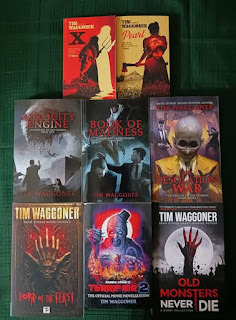
Iposted this image of all the books I had released in 2024, so you may havealready seen it. But I’ll post it here anyway and say if you haven’t read anyof these books, consider doing so in the new year!
I’llhave three books out in 2025 – the novelization of MaXXXine from A24Publishing, a Conan novel called Spawn of the Serpent God from TitanBooks, and my next writing book from Raw Dog Screaming Press called Just AddWriter (which is about tie-in writing). There are no order links for any ofthem yet, but keep them on your radar, please. I may have a couple more booksreleased in 2025, but I don’t know for sure yet. As always, I’ll keep youposted!
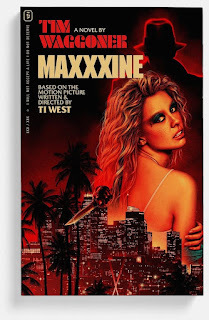
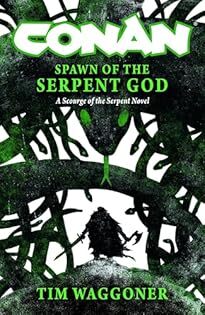
SCHEDULED APPEARANCES
I was scheduled to attend both the Scarelastic BookFair and Books & Brews events this year. Both were scheduled to be held againat the Scarlet Lane Brewing Company in McCordsville, Indiana, but that venue closed,so organizers are looking for somewhere else to hold their events. I’ll let youknow if/when they do. Here are my remaining appearances for the year. (There’sone more I have scheduled, but the organizers haven’t announced myparticipation yet, so I can’t say what it is. I can tell you it’ll be insummer, though.)
· AuthorconV. March 28th to March 30th. Williamsburg, Virginia.
· StokerCon.June 12th to June 15th. Stamford, Connecticut. I’m one of the guests of honor!
· Signingat Vortex Books. June 26th, 5-7pm. Columbia, Pennsylvania.
SOCIAL MEDIA ACCOUNTS
· NewsletterSign-Up: https://timwaggoner.com/contact.htm
· Website:www.timwaggoner.com
· Blog: http://writinginthedarktw.blogspot.com/
· YouTube Channel: https://www.youtube.com/c/timwaggonerswritinginthedark
· Threads:@tim.waggoner.scribe@threads.net
· Bluesky:@timwaggoner.bsky.social
· Facebook: https://www.facebook.com/tim.waggoner.9
· Instagram:tim.waggoner.scribe
November 28, 2024
Writing as Resistance

You’re a writer.
Youlive in a world that has problems – a lot of them – but you’ve alwaysseen glimmers of light in the darkness, and they’ve encouraged you to keep writing,even if you sometimes wondered what the point was.
ThenNovember 5, 2024 happened in America, and now you’re looking at January 20,2025 careening toward us like an out-of-control freight train, and yousee the famous line from Dante’s The Divine Comedy flash across yourmind like the blazing letters on a Times Square jumbotron – “Abandon all hope,ye who enter here.” You’re well aware people sometimes quote that line as ajoke, but you don’t feel much like laughing right now.
Andyou may not feel much like writing, either.
Dreamingdreams then translating them into words on a page (or screen) for others toread might seem like a ridiculous activity in the face of what’s coming, and Iget that. But there are good – maybe even vital – reasons for you tokeep writing.
Let’stalk about some of them.
Butfirst…
Ifyou’re MAGA, the rest of us will take it as a given that you’re thrilled to seeyour Manchild God Emperor ascend the throne for the second time, and you’recreaming your jeans at the thought of him getting to really fuck shit upthis time. We don’t need you to tell us in the comments below, so I’ve turnedthem off for this post. You’ve got plenty of other places on the Internet whereyou can spew your venom, so GTFOH.
Movingon…
Yes,It’s Okay Not to Write
“Writeevery day” is probably the hoariest cliché in writing advice. The idea thatregular practice at something will help you get better at that thing is commonsense. But other writers trying to guilt you into writing, not understandingwriting advice is one-size-fits-all, and that what works for them may notnecessarily work for everyone? That kind of advice you should take with a shitloadof salt. You don’t owe the world your words, and if you don’t have theemotional bandwidth to write at the moment, that’s okay. It’s okay to write,but less frequently than you’re used to. It’s okay to write same amount youalways have. It’s okay to write more often and produce more than you usuallydo. In bad times, you need to take care of yourself, your family, friends,community, etc. If writing is a part of that, to whatever extent, great. If not(at least, not right now), that’s fine. Do what you need to do. But as I said above,there are some good reasons to keep writing.
MakingSomething is Doing Something
Duringtimes when we feel we can’t do anything to make a situation better, doing something,anything reminds us that yes, we can make changes in the world. They may besmall ones, they may affect only a handful of people, but they give us some measureof control over our lives. Making is positive. It’s the opposite of destroying.
YouPractice Mastery
Ilearned this from a therapist who presented it as a technique to help combatdepression and anxiety. Doing something you’re good at (or working to becomebetter at) helps you feel better about yourself. (Just don’t use the fact thatyou’re not where you want to be as a writer – who ever is? – to make yourselffeel worse. Never use your art as a weapon against yourself.)
YouMake Connections
It’sokay to write for yourself and never share your work with another human being,if that’s what you want. But by sharing it – with a friend or family member,with a writers’ group, on your blog or YouTube channel, in the small press,traditional press, indie publishing – you connect with other humans, and ifthey talk about your work with others or review it, you (and they) make moreconnections. If they like your work, they may seek out similar work from otherwriters, making more connections. The number of connections you make doesn’t matter.One is enough. All positive connections with other humans make the world betterbecause you make people (and yourself) feel less alone.
Catharsis– for You and for Readers
Duringhard times people (including writers) have a lot of difficult emotions toprocess, many of which they may not fully understand or be able to face directly.Writing can help you process your emotions, and reading your writing can helpother people process theirs.
YouPromote Critical Thinking
Mybachelor’s degree is in education, and in one class, a professor told us thathalf of the human race doesn’t reach the stage of formal operations, whichmeans they don’t have the capability for true abstract thought. I don’t know ifcurrent research still supports this, but it would go a long way towardexplaining the political divide in America. More recently, researchers havediscovered that some people cannot create pictures in their minds when theythink, and others have no inner narration, no inner voice. Writing is a processof using little marks on a page to encode ideas, and reading is looking atthose little marks and decoding those ideas. Even the simplest fiction andnonfiction requires these skills, and the more challenging a piece of writingis to read, the more critically readers have to think. By writing, you become astronger critical thinker, and by reading your writing, other people get betterat critical thinking, too. Want to help make real, lasting change in the world?Promote critical thinking in yourself and others, and writing is one way to dothis.
YouHelp Create Empathy
Recent(ish)studies have shown that reading – especially fiction – helps strengthen people’sempathy. When we read a story, we’re placed into the mind of another humanbeing (or animal or mythological, whatever). Just learning how to see fromanother point of view is a huge shift in a person’s thinking. Butfiction does more than that. It allows readers to experience life from aperspective that might be very different from theirs. A middle-aged man livingin NYC can get insight into what life is like for a preteen girl in the Ozarks.An American living in 2024 can see what it’s like to have been born and raisedin 1950s Tanzania. Empathy is key tomaking the world a better place. Perhaps the key.
Andof course, writers develop their own empathy through their writing, byidentifying with their characters, understanding how they think and feel, whatchoices they’d make, etc.
Andthis is why your voice is needed, why all of our voices are. Becauseyour voice as a writer is, in reality, the only perspective the story is toldfrom. Everything in your story is you. Your imagination, thoughts, emotions,dreams, fears, joys, insights… The reader’s experience of your point of view,of connecting with you, is what truly creates empathy.
YouHelp People Escape
WhenI was in high school in the late 1970s/early 1980s, I read fantasy primarily,and my favorite series was the Xanth novels by Piers Anthony. I’d read thefirst three books, but had no idea if there would be any more. (There was no Amazonor social media to check and see; hell, PCs were still a few years in thefuture.) One evening, my father and I went to a small local bookstore, and Iwas thrilled to see a new Xanth novel called Centaur Aisle. I bought thebook (I don’t remember which book Dad bought), but when Dad saw it, he asked ifhe could read it first. In my house, the rule was that whoever bought a book gotto read it first. I was surprised by Dad’s request. He’d never asked thisbefore (and he never did again). But I sensed it was important, so I said sure,even though I really wanted to read that book. It didn’t take me long tofigure out what was happening. My mother was going to have surgery the nextday, and while Dad didn’t show it, he was worried about her. He wanted to read CentaurAisle in the hospital while she was on the operating table. It was then Irealized that all fiction of any kind has a power that should be respected, nomatter how bad I might think it is. Because if a book can provide comfort tosomeone during a difficult time, help them escape, even if only for a time, that’san important, even vital function. It’s why works of entertainment should neverbe dismissed out of hand. Hell, if someone can find comfort or escape bywatching a marathon of Porky’s movies, more power to them. Of course,people can find their escape in works of Literature with a capital L. That’sthe point. It doesn’t matter what the work is. It’s the effect it has ona given individual at a specific time in their life that matters.
Isuspect a lot of people are going to need escape and comfort over the next fouryears. Maybe desperately. You can give that to them.
YouHelp People Dream
Yourwriting can help expand people’s imaginations, help them see possibilities theynever have before. The first step to a better world is imagining such a worldis possible, then imagining what we can do to make that dream real. Your workcan help grow and sharpen people’s imaginations.
Creativityis Resistance
InRage Against the Machine’s “Killing in the Name,” one of the lyrics is “Fuck you,I won’t do what you tell me.” Noncompliance, freethinking, imagination,independence, creativity – these are Totalitarians’ kryptonite. There’s areason why artists and artistic expression is rigidly controlled or repressedin their regimes. In the Middle Ages, the Church decided only God could createreality, and theater, by creating a lesser, false reality, was mocking God.Therefore, the Church outlawed theater – with the exception of Biblicalstories. So, one of the things actors did was perform the story of Noah’s Ark,and make the animal characters silly and entertaining. They found a way to defythe Church and create a theatrical experience for their audiences. The sheeract of being creative, on whatever scale, is resistance.
Andon a practical level…
WritingWill Help Keep You Sane
Inaddition to everything I’ve already mentioned, if you’re an artist, practicingyour art allows you to connect to and express your deepest, truest self. It canhelp keep you centered when the entire world feels like it’s falling into chaosand ruin. Brenda Euland, in her book If You Want to Write talks abouthealing one’s self through work. She meant physically and well as psychologically,and while I don’t know if writing will cure my diabetes, I do know how it’shealed my mind and soul. So, heal yourself through work, and who knows? Youjust might help heal the world, too.
Ifyou’d like to check out Brenda’s book, here’s a link: https://tinyurl.com/yh4svyep
DEPARTMENTOF SHAMELESS SELF-PROMOTION
Curiousabout how movie novelizations work? The Hollywood Reporter recentlyinterviewed me about writing the X Trilogy novelizations, and you can read ithere: https://tinyurl.com/5ydwd2m4
Pearl:The Official Novelization Released
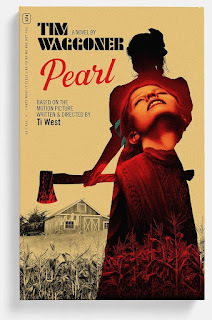
Pearl, my secondnovelization of the films in Ti West’s X Trilogy is out!
Rightnow, the book is only available from A24’s website, but it’ll be available viaAmazon and Barnes and Noble’s sites soon, as well as in physical bookstores. Here’sa link to the book’s A24 page: https://shop.a24films.com/products/pearl-the-novel?srsltid=AfmBOorD_R3f0qroHZun9b5NKNVYEWjOjcD-XLX6_tRHl8DBpP9RV-Ye
Thenovelization of X came out in September, and MaXXXine is scheduledfor release early in 2025.
Custodiansof the Cosmos

Allthree volumes in my Custodians of the Cosmos series are now out!
Thisreview quote for the first book is a good description for the entire series:
“TheAtrocity Engine by Tim Waggoner fuses Urban Fantasy with horror, humor andadventure with shock and gore. And it works splendidly. Gripping from start tofinish, with an antagonist to make you shiver, and kinetic pacing, AtrocityEngine delivers pure, pulpy fun. It left me hungry for more.” – FantasyBook Critic
Youcan pick up The Atrocity Engine, Book of Madness, The Desolation Warhere: https://aethonbooks.com/book-author/tim-waggoner/
Terrifier2: The Official Novelization
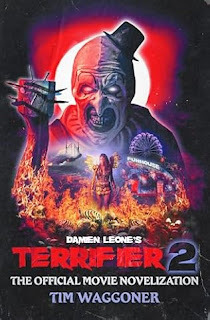
Mynovelization of Terrifier 2 is a hit with reader and reviewers!
“Ifyou can't get enough of Art and his adventures in Miles County, both casual andhardcore fans should be satisfied with this take.” – Fangoria
“Thisis a well-written novelization that packs in some really interesting extradetails and some gnarly new kills, so fans will eat well.” – Film Juice
Youcan pick up the book anywhere, and since so many people have been asking, I’vealready written the novelization of Terrifier 3, but I don’t have a releasedate yet.
OldMonsters Never Die
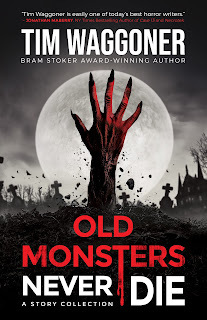
WindingRoads Stories has brought out Old Monsters Never Die, my eighth shortstory collection!
Fromthe mind of four-time Bram Stoker Award winner Tim Waggoner comes eighteenprovocative tales of terror that explore the darkest corners of the human mind.This comprehensive collection concludes with an unforgettable metafictionalstory on what it takes to be a horror writer. With this carefully curatedselection of short stories, discover why no matter how much we try, in ourdeepest subconscious, Old Monsters Never Die.
“Theturns and witty twists that Tim Waggoner so expertly is able to weave into hiswriting ensure that each story is complex, unique, and as readers we alwayswant more!” – Jeremy Fowler
It’savailable from Amazon and B&N, but you can buy direct from the publisherhere: https://windingroadstories.com/project/old-monsters-never-die/
SCHEDULEDAPPEARANCES
Authorcon V. March 28th to March 30th.Williamsburg, Virginia.
Scarelastic Book Fair III. April 5th. Scarlet Lane Brewing Company. McCordsville,Indiana.
StokerCon. June 12th to June 15th.Stamford, Connecticut. I’m one of the guests of honor!
Books & Brews 2.0. August 2nd.
A Really Cool One I Can’t Announce Yet.I’ll let you know more when I can!
WHERE TO FIND ME ONLINE
Newsletter Sign-Up: https://timwaggoner.com/contact.htm Website: www.timwaggoner.com Amazon Page: https://www.amazon.com/stores/Tim-Waggoner/author/B001JP0XFM?ref=ap_rdr&store_ref=ap_rdr&isDramIntegrated=true&shoppingPortalEnabled=true Blog: http://writinginthedarktw.blogspot.com/ YouTube Channel: https://www.youtube.com/c/timwaggonerswritinginthedark Facebook: https://www.facebook.com/tim.waggoner.9 Instagram: tim.waggoner.scribe Threads: @tim.waggoner.scribe@threads.net Bluesky: @timwaggoner.bsky.social
October 27, 2024
Books (Not Just) for Horror Writers
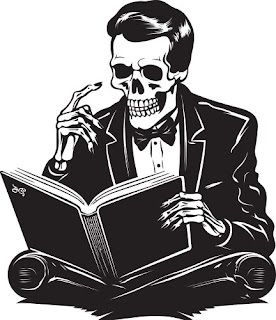
Inmy how-to-write-horror book Writing in the Dark, I included a list ofreference books for horror writers. That was in 2020. I’ve since created anupdated list, and here it is! Most of the books are about the horror genre,writing in the horror genre, or written by horror writers, but a few are booksthat I think can help any writer. If you have any books you’d like to add, putthem in the comments!
101 Horror Books to Read BeforeYou’re Murdered. Sadie Hartmann
About Writing: The Authorized FieldGuide for Aspiring Writers. Gareth L. Powell
Aristotle’s Poetics forScreenwriters, Michael Tierno
Body Trauma: A Writer’s Guide toWounds and Injuries, David W. Page
Capturing Ghosts on the Page:Writing Horror & Dark Fiction,Kaaron Warren
Coffinmaker’s Blues: CollectedWritings on Terror. Stephen Volk
Creativity for Life: PracticalAdvice on the Artist's Personality, and Career from America's ForemostCreativity Coach, Eric Maisel
Creep This Way: How to Become aHorror Writer with 24 Tips to Get You Ghouling. Rebecca Cuthbert
Danse Macabre, Stephen King
Dark Dreamers: Conversations withthe Masters of Horror, Stanley Wiater
Dark Thoughts on Writing, Stanley Wiater
Dark Visions: Conversations with theMasters of Horror Film, StanleyWiater and Tanya Wiater
The Dead Stage: The Journey fromPage to Stage, Dan Weatherer
End of the Road, Brian Keene
Exquisite Horror: Essential Guide tothe Best 150 Books. Alessandro Manzetti
For Exposure: The Life and Times ofa Small-Press Publisher, Jason Sizemore
Forensics and Fiction: Clever,Intriguing, and Downright Odd Questions from Crime Writers, D.P. Lyle
Gentle Writing Advice: How to be aWriter Without Destroying Yourself. ChuckWendig.
Horror 101: The Way Forward, Joe Mynhardt (ed.)
Horror 201: The Silver Scream, Joe Mynhardt and Emma Audsley (eds.)
The Horror … The Horror: AnAutobiography, Rick Hautala
The Horror Writer: A Study of Craftand Identity in the Horror Genre. JoeMynhardt (ed.)
How to Be an Authortunist. Angela Yuriko Smith
How to Write Horror Fiction, William F. Nolan
How to Write Tales of Horror,Fantasy, and Science Fiction,J.N. Williamson
Instigation: Creative Prompts on theDark Side, Michael A. Arnzen
Is Writing. Matt Shaw.
It’s Alive: Bringing Your Nightmaresto Life. Joe Mynhardt and Eugene Johnson(eds.)
Jeani Rector’s Advice on Writing. Jeani Rector
The Kick-Ass Writer, Chuck Wendig
Let Me Tell You a Story. Tim Waggoner
Many Genres, One Craft: Lessons inWriting Popular Fiction, Michael A.Arnzen and Heidi Ruby Miller (eds.)
Mark My Words: Read the SubmissionGuidelines and other Self-editing Tips,Lee Murray and Angelia Yuriko Smith
Michael McCarty
More Modern Mythmakers: 25Interviews with Horror & Science Fiction Writers and Filmmakers. Michael McCarty
Murder and Mayhem: A Doctor AnswersMedical and Forensic Questions for Mystery Writers, D.P. Lyle
My Life with the Living Dead: Autobiography. John Russo
My Quirky Little Memoir: Confessionsof a Small-Press Writer. John R.Little
Now Write! Science Fiction, Fantasy,and Horror: Speculative Genre Exercises from Today’s Best Teachers, Laurie Lamsen (ed.)
Other Words. Brian Keene
On Writing: A Memoir of the Craft, Stephen King
On Writing Horror: A Handbook by theHorror Writers Association, MortCastle (ed.)
Out in the Dark: Interviews with GayHorror Filmmakers, Actors, and Authors, SeanAbley
Plotting and Writing Suspense Fiction. Patricia Highsmith.
Ramsey Campbell: Master of the WeirdFiction. S.T. Joshi
Ramsey Campbell, Probably. Ramsey Campbell
The Readers’ Advisory Guide toHorror, Third Edition, Becky Siegel Spratford
A Reviewer’s Guide to Writing BookReviews: And How to Get Paid for Them. RickHipson.
The Science Fictionary: A Dictionaryof Science Fiction, Fantasy, and Horror. RobertW. Bly
The Scary Movie Writer’s Guide. Seth M. Sherwood
The Scream Writers Handbook: How toWrite a Terrifying Screenplay in 10 Bloody Steps,Thomas Fenton.
Screaming for Pleasure: How HorrorMakes You Happy and Healthy. S.A.Bradley
Shadows & Ink: Mastering the Artof Horror Writing and Publishing. Vols. 1 and 2. Joe Mynhardt
The Shadows & Ink Companion. Joe Mynhardt
Shooting Yourself in the Head forFun and Profit: A Writer’s Survival Guide,Lucy A. Snyder
Something Strange About My Brain. R.L. Stine
Southern Fried and Horrified, Ron Kelly
Starve Better: Surviving the EndlessHorror of the Writing Life, NickMamatas
Stupid Writing Tricks: Tips, Hints,Riffs & Raffs. Daniel Knauf
Supernatural Horror in Literature, H.P. Lovecraft
Techniques of the Selling Writer, Dwight V. Swain
Thrill Me: Essays on Fiction, Benjamin Percy
To Each Their Darkness, Gary A. Braunbeck
Where Nightmares Come From: The Artof Storytelling in the Horror Genre.
Weird Fiction: A Genre Study. Michael Cisco
Wonderbook, Jeff Vandermeer
Write the Fight Right, Alan Baxter
Richard Laymon
Writers Workshop of Horror, MichaelKnost (ed.)
Writers Workshop of Horror 2, Michael Knost (ed.)
Writing for Emotional Impact, Karl Iglesias
Writing in the Dark. Tim Waggoner
Writing in the Dark: The Workbook. Tim Waggoner
The Writing Life, Jeff Strand.
Writing Monsters, Philip Athans
Writing the Paranormal Novel, Steven Harper
Writing the Shadow: Turn Your InnerDarkness Into Words. Joanna Penn
Writing Horror Fiction, Guy N. Smith
Writing the Uncanny: Essays onCrafting Strange Fiction. Dan Coxonand Richard V. Hirst (eds.)
You Can Do Anything Magic Skeleton:Monster Motivations to Get You to Move Your Butt and Do the Thing. Chuck Wendig and Natalie Metzger
Yours to Tell: Dialogues on the Art& Practice of Writing, Steve RasnicTem and Melanie Tem
October 21, 2024
Art Appreciation

Last weekend, I attended the 50thWorld Fantasy Convention in Niagara Falls. I had great time seeing old friendsand making new ones, hanging out with my agent, and meeting with editors. I moderateda panel on AI in Fantasy and Horror, and I was scheduled to do a reading, butwhen I got to the appropriate room, I found my reading had been rescheduled tolater in the day – unfortunately, it was the same time I was due to moderatethe AI panel. So, no reading for me. I also presented my workshop Build aBetter Monster. I was told I’d have maybe ten to twelve people, but I ended upwith a packed house of thirty or more. I virtually presented the same workshopfor Readercon 31, which is available on YouTube if you want to check it out: https://www.youtube.com/watch?v=DWS0llBGrhk&t=48s
Inthe workshop, I discuss what makes effective monsters and how to avoid clichésto create monsters that are fresh and effective, while at the same time tappinginto the underlying archetypes that give them their power. My novelization of Terrifier2 was recently published by Titan Books, and I’ve written the novelizationfor Terrifier 3 as well, although I have no idea when it will be out. I’vespent a lot of time with Art the Clown (metaphorically speaking, of course,otherwise, I’d be extremely dead right now) over the last year or so, and I’vethought a great deal about why Art and the Terrifier films are soinsanely popular, and one of the major reasons is that Art’s a perfect exampleof how to build a better monster. So this time, I thought I’d talk about whyArt is so popular with viewers, why he’s such an impactful monster, and how youcan use the lessons Art has to teach to create your own kick-ass monsters. Butlet me say a few words first. . .
WheneverHorror creators develop a new monster, some of the choices we make areconscious, but a lot are unconscious, too. I make no claim that all the aspectsof Art I’ll talk about were consciously chosen by series writer/director DamienLeone, or by David Howard Thornton, the actor that portrays Art. I’m going totalk about what I see in the character. And while I may have written twonovelizations of Terrifier films (with hopefully more to come), I haveno special insider knowledge of the character.
Aword of warning, too. If you haven’t seen the movies, there may be some mildspoilers in this discussion. Proceed at your own risk.
Okay,let’s get to it!
Inthe Build a Better Monster workshop, I talk about the core underlying qualitiesthat monsters are based on. Here’s the list I use, but I’m sure you can thinkof more qualities to add to it. I’ll put an asterisk next to the qualities Ithink apply to Art.
· Predator*
· Agentof Death (Deathbringer)*
· Transformer(of others, of self)
· Dualityof Self/Existence*
· Tormentor*
· Tempter/Corrupter
· Controller
· Disease-Spreader
· Agentof Decay/Entropy
· Embodimentof Pure Evil*
· Embodimentof Wildness/Cruelty/Indifference of Nature/the Universe*
· Agentof Chaos*
· Violatorof Reality*
· Agentof Afterlife
· TheLifeless Comes to Life
· Conqueror
· OpposingForce*
· PhysicalThreat*
· Emotional/Psychological
· SpiritualThreat
· ElementalForce
· Threatof Others: Community, Family, Lovers, Parents, Children
The most effective monsters tend to embodymore than one quality on the list. For example, Romero zombies are a combinationof the following qualities: Predator, Agent of Death, Agent of Decay/Entropy,Disease-Spreader, Transformer of Others, Threat of Others, Violator of Reality,Agent of Afterlife, Embodiment of Indifference of Universe. Art embodies nineof the qualities on the list, to one degree or another.
Let’sget into some specifics.
ArtEmbodies the Nightmare/Evil Clown Tropes – but with a Difference.
Thescary clown trope has been around probably since the first clown thought, Youknow what’s missing? A bunch of paint on my face. The Nightmare/Evil Clown isn’tjust scary, though. It’s a monstrous lunatic killer. The Joker is the epitome ofthe Evil Clown, and Pennywise is the epitome of the Nightmare Clown. But Art isboth the Evil and the Nightmare Clown combined. He’s also a mime, so he doesn’tspeak, just as Michael and Jason don’t. The tortures Art inflicts on hisvictims are, for the most part, realistic, and when he kills, he often projectsthe sick satisfaction of a human killer. That’s Evil Clown. But when Art’storture continues and moves from realistic violence (he shoots or stabs avictim) to grotesquely surreal violence (shoving mashed potatoes into thegaping void of a dead woman’s face while the corpse is seated at a dining table)he’s Nightmare Clown. His ability to shift back and forth between these twoaspects keep viewers off balance, and since Fear of the Unknown is the basis forall Horror, this shifting makes Art unknowable, increasing the audience’sdread. Classic Vampires are safe Horror tropes. We know exactly what they willdo at all times in a story. Nothing about Art is safe, which is a vital qualityfor a truly effective Horror character.
Artmakes his victims suffer – often for a long time – before they finally die, andhe enjoys the hell out of it. He enjoys the smallest cruelty he inflicts asmuch as the most horrendous torture. He likes to hurt people, both physicallyand psychologically (by taunting them, showing them the mutilated remains offriends and family, etc.). And because he can act silly in the course oftorturing and killing someone, because he interacts with them, victims hopethey can somehow reason with him and get him to stop hurting them. Who bothersto plead with Jason, Michael, Pennywise, or Freddy? There’s nothing about themthat’s remotely human. But Art sometimes acts human, and because ofthis, his victims aren’t sure how to relate to him, aren’t sure what to expect.They hope what’s happening will somehow be revealed as a big joke. But of course,the joke’s on them. Jason and Michael are killers, but they aren’t Evil.Art’s sadism and how he revels in it make him the absolute embodiment of Evilwith a capital E.
ArtEmbodies the Fear of an Excruciatingly Painful Death.
Jasonand Michael are reworkings of the Grim Reaper image – silent, with hard whitefeatures that don’t move (like a skull), dressed in monochromatic clothing (likea black robe), and they harvest lives with metal instruments, Michael with abutcher knife, Jason with a machete (both substitutes for a scythe). They embodythe fear of an approaching death that creeps up on you and then takes you whenyou least suspect it. But Michael and Jason are extremely merciful killers. Theyswiftly dispatch their victims who die almost as quickly and easily as if theyhave an off switch that gets flipped. Their suffering, if they suffer at all,is minimal. This makes both Jason and Michael safe killers for anaudience. Their victims basically vanish into nothing like videogame NPCs that dereswhen they’re killed. And Jason and Michael don’t have emotional responses to killing.They kill like mindless, emotionless machines. They’re basically the Terminator,but wielding blades instead of guns.
Artisn’t the Grim Reaper. Art is Cancer. He gets inside you (quiteliterally, by cutting and gutting you) and kills you from within, slowly,painfully, and you are awake and aware and feel every goddamned horrible secondof your body dying one small piece at a time. And the audience is forced to endurethat awfulness alongside the victim, heightening the empathy they feel towardthe victim. Who feels bad for Jason, Michael, and Freddy’s victims? They existsimply to be blown out like a candle flame, and whatever discomfort we mightfeel over their deaths passes in an instant, just like they do. But in the Terrifierfilms, the audience isn’t given that mercy. Rob Zombie does the same thing inhis films. He does not look away from pain. He does not make death clean andeasy, because in real life death is never like that. That makes Zombie’s andLeone’s films honest. Their kills are ugly and brutal because killing is alwaysugly and brutal. When killing is portrayed as easy and without any real impactor consequence, it’s dishonest. Worse, it’s importance is minimized.
ArtIsn’t Merely a Killer. He’s a Tormentor/Torturer.
Hehas this in common with Freddy. Freddy is basically a repackaged Satan – a demonicfigure associated with fire who torments people in a hellish realm while wieldinga pitchfork (his knife-glove). Freddy torments the kids of Elm Street to punishtheir parents for the sin of killing him. Art torments and tortures because it’sfun and exciting for him. It amuses him to see his victims reduced to what heviews as a ridiculous state. There is no rhyme or reason to how he chooses hisvictims (again, he’s like cancer this way). Even Freddy dispatches his victimsquickly when he decides to kill them, and his torments never go on very long.He’s way more merciful than Art in that sense. And once Freddy became ajokester, he lost his edge as a monstrous force. Art can be both a jokester anda terrible force of annihilation at the same time, without ever losing his effectivenessas a monster.
Artis Unpredictable.
Theaudience knows that Art is most likely going to kill someone he encounters(although not always), but we don’t know when or how that’ll happen, how longit will take, and how bad it’ll be. Art’s like a cat that way. He plays with hisfood before eating it. Art is an Agent of Chaos in the deepest sense. Jason,Michael, and Freddy all have rules. Jason kills whoever’s foolish enough tocome to Camp Crystal Lake. Michael kills people only on Halloween, and (in mostversions of his story) he wants to kill his sister (or niece or nephew) most ofall. Freddy wants to torment and kill the children of his murderers. Rules makeHorror characters safer for audience members. Art has no rules. He’s bloodyfucking anarchy from start to finish. He’s an (un)natural disaster.
There’sa Deep Ongoing Mystery to Art.
Michaelis an enigma in terms of his motivations and internal world (if he even hasone). Jason’s only mystery is how the hell he came back to life after drowningas a child. Freddy’s mystery is how a murdering child molester became a dreamgod after he died. Only Michael’s mystery is an actual part of the movies. Jason’sand Freddy’s are just plot holes. Art’s mysteries are part and parcel of the films.What the fuck is he exactly? Human, demon, some combination? What’s hisconnection to Sienna’s dad? What’s his connection to the demonic entityembodied as the Little Pale Girl in T2 and Victoria Heyes in T3? What the ever-loving-hellis the Clown Café? How does Art get there? Can he travel through dimensions? It’sclear he has some purpose related to the Big Bad Demon, but what is it? Is hejust a servant? Is he a full-fledged partner? Do the demon and Art have anypurpose beyond mutilating and killing as many people as they can? What’s Art’sconnection to Sienna? Can she really defeat him and the demon?
Leoneis creating a mythology for Art and Sienna piece by piece, and the audience is witnessto the ongoing evolution of this mythology. No other Horror icon I can think ofhas this rich of a background. Pennywise is just a fucking giant space spider. AndMichael, Jason, and Freddy are so small in comparison to Art.
There’sa David and Goliath Aspect to the Ongoing Story.
Siennavs. Art is the age-old struggle of Good vs Evil, but with a David and Goliath elementtossed in. Sienna is portrayed as a real, everyday-type person, not anidealized figure (her brother Jonathan is portrayed this way too), so we canempathize with her and root for her more deeply than we might for Ellen Ripley,Laurie Strode, or Sarah Conner. In the third film, Sienna and her brother arestill dealing with the trauma of their encounter with Art in the second film,and even with the Divine help that Sienna receives, there’s no guarantee shecan stop Art or the Big Bad Demon. She sure as shit hasn’t been able to stopthem from killing all her family and friends.
Artis An Active, Present Monster, and He Interacts with People.
Artdoes not lurk, stalk, or hide. He does not spring out from behind a tree in thewoods, kill someone, then disappear. Art shows up, interacts with people –often in small, silly ways – and he communicates with them (silently) and respondsto their words and actions. He interacts. Jason and Michael don’tinteract with the outer world or anything in it, including people. Freddytorments his victims verbally as well as physically, but he talks atthem. There’s no real back and forth between him and his victims. Art is an intimatemonster this way, and his seeming connection to others makes the tortures heinflicts on them so much worse. Michael and Jason don’t know their victims arepeople. They’re just moving meat they want to turn into unmoving meat. Freddy’svictims are just names to be cross off a list as he pursues revenge. But Art knowshis victims are people, and he delights in destroying them. And Art is presentin the world. In T2 he goes into a laundromat to wash his blood-soaked outfit. He’sright there, out in the open, naked, for anyone to see. He walks down streets,he drives vehicles, he wanders into stores and bars. . . He can be anywhere atany time, and he’ll be right there, out in the open, and although you can see him,although you know he’s coming, there’s still not a goddamned thing you can doto protect yourself or escape him.
Artisn’t Just Duality of Self. He is Legion.
SometimesArt is a primal evil force. Sometimes he’s a clown performing silly bits for thepeople around him. Sometimes he’s a mischievous, naïve little boy (and theinnocence he projects at these times is an effective counterpoint to his sadism).Sometimes he’s a cold, methodical sadist. He’s a killer, a tormentor, a torturer,a butcher. He’s a physical being (who sometimes has to wash his outfit) who canbe injured like anyone else (although he’s more resilient than regular humans),but he’s also a supernatural thing that can return from the dead. He can shiftbetween these aspects of himself with fluid swiftness, and we never know whichArt we’re going to get, so we’re always off balance, always holding our breathbecause we know that eventually, he’s going to become the monster he is deep down.This makes him the absolute embodiment of Chaos. We have David Howard Thorton’sgenius as a performer to thank for this complex portrayal of what might seem atfirst to be a simple Horror antagonist. Art is anything but simple.
Myabsolute favorite moments in the Terrifier films are when Art drops allthe pretense, stops putting on a performance, and his eyes go cold and dead andhis features go slack. Only in those moments do we get to see what Art reallyis, and that’s when he’s the most terrifying.
SummingUp
TheTerrifier films are a delight for gorehounds. They’re like a walkthrough a haunted house attraction (like the Terrifier itself) to see how muchyou can endure, and then you can laugh about the experience with friends onceyou’re safely outside. And there’s nothing wrong with appreciating the movieson that level alone. But Art the Clown is a fantastic case study in how to takean old worn-out trope, breathe new life into it by combining different Horrorarchetypes, and end up with one of the greatest movie monsters of all time. Ifyou’re a Horror writer, see if you can do the same in your own work. And if you’rea Horror fan, I hope you come away from this essay with a deeper awareness of andappreciation for our boy Art.
It'sArt’s world, and we’re just (until he catches up with us) living in it.
DEPARTMENTOF SHAMELESS SELF PROMOTION
Terrifier2 NovelizationReleased
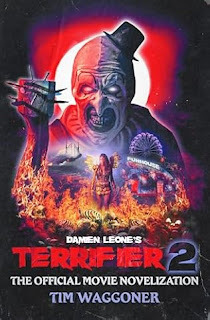
Mynovelization of Terrifier 2 came out Oct. 8th, just a fewdays before the release of Terrifier 3 movie (almost as if Cineverse andBloody Disgusting planned it that way). It’s 100,000 words long, and half ofthat is material I added to the story. So far, reader reaction has beenoverwhelmingly positive, which warms my cold, dead heart.
Synopsis:
Thenightmarish Art the Clown returns from the dead to continue his murderous andmad spree, in this gruesome novelization of the hit horror film.
Ithas been one year since the sleepy town of Miles County survived the murderousspree of demented killer Art the Clown, but little do they know the nightmareis about to begin anew.
Resurrectedby a sinister entity, Art is back with an appetite for murder andmayhem—setting his sights on the recently bereaved teenager Sienna and heryounger brother Jonathan. The streets are about to run with blood, and Siennamust somehow survive this gruesome Halloween night and discover how to defeat abrutal and unforgiving killing machine from beyond her nightmares.
There'sno stopping Art once his sights are set on you…
Orderlink:
https://titanbooks.com/72530-terrifier-2/
(Titanhas links to various sites where you can buy the book.)
Fangoria Review of the Terrifier2 Novelization
Iwas thrilled that Fangoria decided to review the Terrifier 2novel. I believe it’s the first time I’ve ever had any fiction of mine reviewedby Fango, so this was a definite bucket-list item for me. It’s a positivereview, but be warned: it’s a bit spoilery.
Excerptfrom the Terrifier 2 Novelization in Variety
Iwas really surprised to discover that Variety published an excerpt fromthe book. Writers are always the last to know about things like this. If wedidn’t do daily Google searches on ourselves, we might never find out. If youhaven’t seen the movie, be warned: the scene Variety chose to publishwas the absolute most brutal one in the film. If you’ve seen the movie, I’msure you know which scene I’m talking about.
X NovelizationReleased
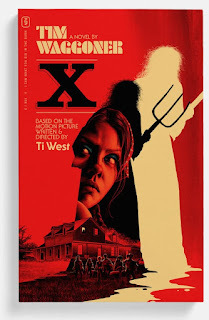
Iwas thrilled to be asked to write novelizations for Ti West’s X Trilogy, andthe X novel came out Sept. 1st. Unlike the Terrifierbooks, the X Trilogy novels are slim, around 44,000 words apiece. Ti Westdidn’t want me to add any material of my own to his story, and movie scriptsare too short to make full novels. Ti’s feelings about someone else expandinghis stories are perfectly understandable, and work-for-hire is a differentbeast than writing your own original work. The IP holder is the boss, and youhave to do what the IP holder says. Plus, A24 went with a retro 1960s/1970spulp paperback vibe for the trilogy’s cover designs (which were created by artistMatt Ryan Tobin), and those books were always short, fast reads. So shorterbooks fit the aesthetic A24 was going for. Reaction to the X novel sofar has been extremely positive, and I’m glad people are enjoying the book.
Synopsis
Whenscreams of X-tasy turn into cries for help!
In1979, a group of young filmmakers set out to make an adult film in rural Texas.But when their reclusive, elderly hosts catch them in the act, the cast findthemselves fighting for their lives…
Writtenby four-time Bram Stoker Award-winning writer Tim Waggoner, this thrillingnovelization is printed in throwback pocket-sized paperback format, bringingbeloved scream queens Pearl and Maxine to a new medium. Relive the tragedy thatbefell Lorraine, Bobby-Lynne, Jackson, Wayne, RJ, and Howard with grisly newdetails drawn from West’s original screenplay.
AsSherrif Dentler would say: it’s one goddamn fucked up horror story.
OrderLinks
B&N:https://www.barnesandnoble.com/w/x-tim-waggoner/1146311639?ean=9781960078209
Fangoria Interview AboutWriting the X Trilogy Novels
Wantto know all about the writing of the X Trilogy novels? Fangoria interviewed meabout the books, and you can learn all the behind-the-scenes goss here:
TheDesolation War – the Concluding Volume in the Custodians of the Cosmos Series – is Released
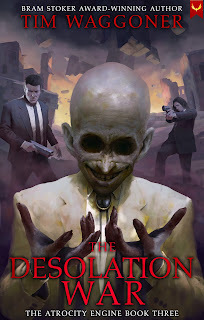
Ihad a blast writing this dark fantasy adventure series, and if you’d like tosee me write more adventures of Neal and Gina, contact the good people atAethon Books and let them know. If you’re not familiar with the series, the firstvolume is The Atrocity Engine and the second is Book of Madness.
Synopsis
RachelBlackburn is back, and she’s more powerful – and terrifying – than ever.
She’snow one of the Lightbringers, an ancient race of cosmic beings dedicated to“saving” the Omniverse from the ravenous Gyre by absorbing it into themselvespiece by piece.
ButRachel doesn’t give a damn about the Lightbringers’ mission.
Sheintends to use her new powers to get revenge on the two Maintenance agents whostopped her from activating the Atrocity Engine – Neal Hudson and GinaSandoval. And when she’s finished with them, she’s going to destroy BrotherNothing and the entire Multitude.
Tocomplicate matters further, Neil and Gina find themselves trapped on adevastated parallel Earth overrun with Aberrants – and where a Kaiju-sizedversion of Teguzilla lives.
Ifthey don’t find a way to win this war, they won’t have a home to return to.
Timeto roll up their sleeves and get to work . . . one last time.
OrderLinks
Authorcon V. March 28th to March 30th.Williamsburg, Virginia.
Scarelastic Book Fair III. April 5th.Scarlet Lane Brewing Company. McCordsville, Indiana.
StokerCon. June 12th to June 15th.Stamford, Connecticut. I’m one of the guests of honor!
Books & Brews 2.0. August 2nd.
A Really Cool One I Can’t Announce Yet. I’ll let youknow more when I can!
WHERE TO FIND ME ONLINE
Newsletter Sign-Up: https://timwaggoner.com/contact.htm Website: www.timwaggoner.com Amazon Page: https://www.amazon.com/stores/Tim-Waggoner/author/B001JP0XFM?ref=ap_rdr&store_ref=ap_rdr&isDramIntegrated=true&shoppingPortalEnabled=true Blog: http://writinginthedarktw.blogspot.com/ YouTube Channel: https://www.youtube.com/c/timwaggonerswritinginthedark Facebook: https://www.facebook.com/tim.waggoner.9 Instagram: tim.waggoner.scribe Threads: @tim.waggoner.scribe@threads.net Bluesky: @timwaggoner.bsky.social
August 5, 2024
Dealing with Authors Who are Jerks, Bastards, or Downright Evil in Real Life
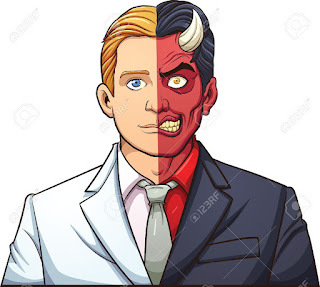
(I originally wrote this entry in August 2024. I used "problematic" in the title in an attempt to cover a broad category of writers whose behavior readers might take issue with. But as I write this addendum on January 14th, after the horrific details about Neil Gaiman came out, "problematic" is far too mild a term, so I changed the title.)
I wrote the following mini-essay forthe latest edition of my newsletter. I try to avoid repeating content betweenmy blog, newsletter, and YouTube channel, but since a number of my newsletter readerscontacted me to say how much they appreciated the essay and that it should havea wider audience, I thought I’d share it here as well.
Ayear or so ago, author Tom Monteleone posted a screed on Facebook complainingabout how the Bram Stoker Awards were no longer awarded for merit but rather toserve a social engineering agenda. He claimed nominees were chosen primarilybecause they were BIPOC or LQBTQ+, not because of the quality of their writing.In this post, he also insulted specific writers he felt were unworthy of theaward. The post received the sort of reaction from the Horror community thatyou’d expect, and Tom reached out to a number of writers via email to explainthat he wasn’t racist, that the hard-edged and sometimes-controversial persona heeffects got the better of him. (If he was sincere, he would’ve posted this onFacebook too, but he didn’t.) Then the next night, he went on a podcast hostedby a couple alt-right dudes, was obviously drunk, and doubled then tripled downon his racist/sexist/homophobic/transphobic comments. He succeeded inimmolating his career and tanking his small-press publishing companyBorderlands Press.
Tomrecently decided to start a newsletter on Substack, and the first issue wentout to all his email contacts, not just those who chose to subscribe to hisnewsletter. I received that email, and it was Tom’s Screed Part II. Hereiterated the same points he’d made a year ago, and he attacked someadditional writers he felt weren’t worthy of the Stokers’ Lifetime AchievementAward. I was saddened to see Tom hadn’t learned anything in the interveningyear, but I wasn’t surprised. I wrote a blog entry about older white malecishet writers with, shall we say, limited perspectives. You can read it here: https://writinginthedarktw.blogspot.com/2023/01/an-open-letter-to-my-fellow-old-white.html
Iconsidered Tom a friend and a mentor, so the situation with him was a difficultone for me to deal with emotionally. I broke off contact with him, and unlesshe makes sincere, public amends to the Horror community – and especially to theauthors he denigrated – I don’t intend to have any contact with him ever again.
Sometimes peoplelike Tom and the Grand High Terf J.K. Rowling out themselves as toxic. Othertimes – as with the recent sexual abuse allegations against Neil Gaiman – otherscome forward and out them. But how should we react when a writer we admire, orwho we have a personal relationship with, turns out to be a not-so-good person?The short answer, of course, is you can react any damn way you wish. There’s noright way. But I can share with you how I attempt to navigate these roughwaters.
· Can you separate the art from the artist? Should you? I have an MA inEnglish Literature with a Creative Writing Concentration. Our professors wereup front about authors’ often problematic backgrounds. Poet Ezra Pound was afascist. Edgar Allan Poe married his thirteen-year-old cousin, and he wrotevicious literary criticism of writers he disliked. Lovecraft was racist. Dickenswas rumored to have had an affair with his sister-in-law. Our professors taughtus that these writers weren’t literary gods to be worshipped, but humans likeus, with all the good and bad that comes with being human. We could read theirwork and ask how their racism, fascism, sexism, homophobia, etc. influencedtheir writing. We could also read their work knowing that it represented thebest part of themselves, while not ignoring the negative aspects of theirpersonalities. Or we could say “Fuck that guy,” and never read anything by themagain. But all these responses had us engaging with the complex anduncomfortable reality of art vs artist vs society.
· Problematic writers are good models of what notto be.If you’re introspective (and if you’re a writer, you should be), once aproblematic writer shows their whole ass in public, you’ll examine yourself tosee if you have any of their issues inside you. When I first started writing atthe age of eighteen, self-publishing was considered something only failedwriters did. It took me a while to see indie publishing as a viable option forwriters. I had a prejudice to overcome, and seeing people rail againstself-publishing over the years and listening to counterarguments helped meovercome it. So while problematic writers cause damage to the community and toindividuals (in the case of Rowling, damage on a worldwide scale), they canalso have a positive effect in some ways. After Tom’s first attack on HWA’srecent LAA honorees, I gathered all the physical books of his that I have andput them on one of the bookshelves in my living room where I see them all thetime. They’re a constant reminder to me keep my mind and heart open and tocontinue trying to be a better person today than I was yesterday.
· Don’t put writers (or anyone else) on a pedestal. Tom’s books alsoremind me of this. As I mentioned earlier, it’s important to remember thewriters whose works we admire are human. But we also dehumanize people when weput them on a pedestal. Whether you denigrate a person or lionize a person, youaren’t giving them the respect of treating them as fully human. People aren’tdemons and they aren’t gods. They may do horrible things or wonderful things,but those things are part of the range of human behavior, for better or worse.
· Don’t immediately engage in a social media pile-on. This is my policy,and you may feel differently – and if so, you do you – but let me explain myposition. Once a scandal in the writing community breaks, I try to give myself48 hours before responding to it online. I read other people’s posts about itand consider them, but I wait to see if it’s a real situation, a real situationthat’s being exaggerated, or not a real situation. I don’t want to contributeto the early noise and confusion that accompanies a scandal, and I certainlydon’t want to potentially do any harm to someone or to their career. It alsotakes me a while sometimes to sort out my thoughts and feelings about asituation. An immediate post from me would be something inarticulate like “Thisam bad.” Some people undoubtedly post quick reactions because they have astrong moral stance regarding the situation. Others respond fast becausethey’re acting emotionally and have to post their feelings now. Somepeople rush to post because they want to show immediate solidarity with thecommunity, and I suspect that some might post out of fear that they’ll beviewed as silently approving of an offender’s behavior, which could end up gettingthem canceled. Waiting to post about a problematic writer scandal works bestfor me, but your mileage may vary.
· It’s okay to have mixed feelings about the situation –maybe very mixed. I never got into Harry Potter, but my wife anddaughters did, as did a number of my friends and colleagues. So when J.K.Rowling outed herself as the Queen of Transphobia it didn’t have any emotionalimpact on me. But if you grew up reading her books, if they were important toyour development as a person, it can be difficult as hell to reconcile yourfeelings about the work with your feelings about Rowling’s current pathologicallyshitty behavior. I’m here to tell you that however you feel is okay. Never wantto read Harry Potter books again? Fine. Want to still read them, but with fullawareness of how awful Rowling is to trans folks? Fine. Want to honor your pastexperiences of her work while recognizing what a terrible human being she’sbecome? That’s healthy. Want to publicly boycott her work? Go for it. Findyourself doing any or all of these things at different times as you try to dealwith your emotions? Perfectly normal. The only response I advise against is puttingon blinders and pretending that a problematic writer isn’t problematic. That’s nothealthy.
· Don’t let the reveal of a problematic writer stop youfrom writing.Maybe you viewed Rowling or Gaiman (or in my case, Monteleone) as a role model.You learned to write by studying their work, listened to their advice onwriting and publishing, and learned how to comport yourself as a professionalby observing their career. None of those experiences are invalidated by therevelation that your role model is a horrible human being in one or more areasof their life. The knowledge you gained is yours, and you could’velearned the same lessons from a zillion other writers. You just happened tolearn them from someone who, while a good (maybe even great) writer, is ashitty human. Use that knowledge to create and bring positive things into theworld. Balance the scales, at least a little, by using your light to countertheir darkness.
· Acknowledge that these situations suck and willcontinue to suck.Some people will always be sad about Rowling’s transphobia. I’ll always be sadabout Tom. It’s okay to be sad, and while you’ll likely adjust to your sorrowover time, it’ll never be fully gone. You need to find a way to make peace withthat somehow and just keep going.
I like this resource from the American LibraryAssociation: “Addressing Challenges to Books by Problematic Authors Q&A” – https://tinyurl.com/y5tt2ca8It presents a thorough analysis of the issues involved in dealing with authors whoare deemed problematic. It’s written for librarians, of course, not individualreaders, but I think it still presents a lot of good points for readers toconsider.
Feel free to leave a comment below, but because many peoplehave strong emotions regarding this topic, please keep your comments civil and constructive.I’ll remove any comments that attack others or spew vitriol for its own sake.
DEPARTMENT OF SHAMELESS SELF-PROMOTION
Bookof Madness ,Book 2 in the Custodians of the Cosmos series is Out Now
Addto this. . .
–A visit from Gina’s sister Juliana, who might be a double agent serving theBlack Trust.
–A member of the Multitude known as Bad Jack, who changed the course of bothNeal and Donnie’s lives when they were young, and who now seeks to obtain the Insanitariumfor his own nefarious ends.
–An extradimensional trip to the deadly realm called Low Town.
–And the birth of a very special little girl.
Itall adds up to one very bad day for Neal and Gina, but in order to get the jobdone, they’ll have to risk more than their lives. They’ll have to risk theirimmortal souls.
Nopressure.
Paperback:https://tinyurl.com/5n8z78fx
Kindle:https://tinyurl.com/bddetj5u
Audiobook:https://tinyurl.com/2s3fu6vt
Praisefor Book One: The Atrocity Engine
"Waggoneroffers a fresh variation on the trope of a covert agency combating evil in hisblood-drenched Custodians of the Cosmos series opener."- Publishers Weekly
"TheAtrocity Engine is a wild ride full of entertaining scenarios and scarymonsters!" - Booklist
"THEATROCITY ENGINE is a kick-ass cross-genre thrill ride of a novel! Holy moly!Tim Waggoner is easily one of today's best horror writers."- JonathanMaberry, NY Times bestselling author of CAVE 13 and NECROTEK
"Thisis edge-of-your-seat Horror Fantasy. It's as if Stephen King wrote MEN INBLACK!" —Scott Sigler, #1 NYT Bestselling author of EARTHCORE
"Fast-paced,cleverly thought-through, and deeply unnerving in all the right places—urbanhorror fantasy with a decidedly creepy difference. Don't read it in thedark!" - Diane Duane, New York Times bestselling author of TALES OFTHE FIVE: THE LIBRARIAN
"Thestory is a thumping, genre-bending tale—one part horror, one part fantasy, andtwo parts thriller. The pace is frenetic, and the writing delivers. There is anabundance of action and gore, which, delightfully, is not always blood (biggreen snot tentacles or giant serpents made of corpses, anyone?). For readerswho like their tension and thrills to emerge from another Universe, THEATROCITY ENGINE is one heckuva ride." - G.A. Rivers, The Big ThrillRecommends
Terrifier2: The Official Novelization is Up for Preorder
TitanBooks will be bringing out this novel on Oct. 8th – just in time forthe theatrical release of Terrifier 3! I had an absolute blast writingthis book, and I hope Terrifier fans will love it! Brad Miska of BloodDisgusting said this about the novel:
“Terrifier2 is seriously one of the coolest and most entertaining novelizations I’veever read. @timwaggoner absolutely crushed it!”
How’sthat for an early review? Here’s the synopsis:
Thenightmarish Art the Clown returns from the dead to continue his murderous andmad spree, in this gruesome novelization of the hit horror film.
Ithas been one year since the sleepy town of Miles County survived the murderousspree of demented killer Art the Clown, but little do they know the nightmareis about to begin anew.
Resurrectedby a sinister entity, Art is back with an appetite for murder andmayhem—setting his sights on the recently bereaved teenager Sienna and heryounger brother Jonathan. The streets are about to run with blood, and Siennamust somehow survive this gruesome Halloween night and discover how to defeat abrutal and unforgiving killing machine from beyond her nightmares.
There'sno stopping Art once his sights are set on you…
Orderlinks: https://titanbooks.com/72530-terrifier-2/
SCHEDULEDAPPEARANCES
IGW Genre Con. August 17th to August 18th.Huntington, West Virginia.
World Fantasy Convention. October 17th to October 20th.Niagara Falls, New York.
Authorcon V. March 28th to March 30th.Williamsburg, Virginia.
StokerCon. June 12th to June 15th.Stamford, Connecticut.
WHERE TO FIND ME ONLINE
Newsletter Sign-Up: https://timwaggoner.com/contact.htm Website: www.timwaggoner.com Amazon Page: https://www.amazon.com/stores/Tim-Waggoner/author/B001JP0XFM?ref=ap_rdr&store_ref=ap_rdr&isDramIntegrated=true&shoppingPortalEnabled=true Blog: http://writinginthedarktw.blogspot.com/ YouTube Channel: https://www.youtube.com/c/timwaggonerswritinginthedark Facebook: https://www.facebook.com/tim.waggoner.9 Instagram: tim.waggoner.scribe Threads: @tim.waggoner.scribe@threads.net Bluesky: @timwaggoner.bsky.social
Dealing with Problematic Authors

I wrote the following mini-essay forthe latest edition of my newsletter. I try to avoid repeating content betweenmy blog, newsletter, and YouTube channel, but since a number of my newsletter readerscontacted me to say how much they appreciated the essay and that it should havea wider audience, I thought I’d share it here as well.
Ayear or so ago, author Tom Monteleone posted a screed on Facebook complainingabout how the Bram Stoker Awards were no longer awarded for merit but rather toserve a social engineering agenda. He claimed nominees were chosen primarilybecause they were BIPOC or LQBTQ+, not because of the quality of their writing.In this post, he also insulted specific writers he felt were unworthy of theaward. The post received the sort of reaction from the Horror community thatyou’d expect, and Tom reached out to a number of writers via email to explainthat he wasn’t racist, that the hard-edged and sometimes-controversial persona heeffects got the better of him. (If he was sincere, he would’ve posted this onFacebook too, but he didn’t.) Then the next night, he went on a podcast hostedby a couple alt-right dudes, was obviously drunk, and doubled then tripled downon his racist/sexist/homophobic/transphobic comments. He succeeded inimmolating his career and tanking his small-press publishing companyBorderlands Press.
Tomrecently decided to start a newsletter on Substack, and the first issue wentout to all his email contacts, not just those who chose to subscribe to hisnewsletter. I received that email, and it was Tom’s Screed Part II. Hereiterated the same points he’d made a year ago, and he attacked someadditional writers he felt weren’t worthy of the Stokers’ Lifetime AchievementAward. I was saddened to see Tom hadn’t learned anything in the interveningyear, but I wasn’t surprised. I wrote a blog entry about older white malecishet writers with, shall we say, limited perspectives. You can read it here: https://writinginthedarktw.blogspot.com/2023/01/an-open-letter-to-my-fellow-old-white.html
Iconsidered Tom a friend and a mentor, so the situation with him was a difficultone for me to deal with emotionally. I broke off contact with him, and unlesshe makes sincere, public amends to the Horror community – and especially to theauthors he denigrated – I don’t intend to have any contact with him ever again.
Sometimes peoplelike Tom and the Grand High Terf J.K. Rowling out themselves as toxic. Othertimes – as with the recent sexual abuse allegations against Neil Gaiman – otherscome forward and out them. But how should we react when a writer we admire, orwho we have a personal relationship with, turns out to be a not-so-good person?The short answer, of course, is you can react any damn way you wish. There’s noright way. But I can share with you how I attempt to navigate these roughwaters.
· Can you separate the art from the artist? Should you? I have an MA inEnglish Literature with a Creative Writing Concentration. Our professors wereup front about authors’ often problematic backgrounds. Poet Ezra Pound was afascist. Edgar Allan Poe married his thirteen-year-old cousin, and he wrotevicious literary criticism of writers he disliked. Lovecraft was racist. Dickenswas rumored to have had an affair with his sister-in-law. Our professors taughtus that these writers weren’t literary gods to be worshipped, but humans likeus, with all the good and bad that comes with being human. We could read theirwork and ask how their racism, fascism, sexism, homophobia, etc. influencedtheir writing. We could also read their work knowing that it represented thebest part of themselves, while not ignoring the negative aspects of theirpersonalities. Or we could say “Fuck that guy,” and never read anything by themagain. But all these responses had us engaging with the complex anduncomfortable reality of art vs artist vs society.
· Problematic writers are good models of what notto be.If you’re introspective (and if you’re a writer, you should be), once aproblematic writer shows their whole ass in public, you’ll examine yourself tosee if you have any of their issues inside you. When I first started writing atthe age of eighteen, self-publishing was considered something only failedwriters did. It took me a while to see indie publishing as a viable option forwriters. I had a prejudice to overcome, and seeing people rail againstself-publishing over the years and listening to counterarguments helped meovercome it. So while problematic writers cause damage to the community and toindividuals (in the case of Rowling, damage on a worldwide scale), they canalso have a positive effect in some ways. After Tom’s first attack on HWA’srecent LAA honorees, I gathered all the physical books of his that I have andput them on one of the bookshelves in my living room where I see them all thetime. They’re a constant reminder to me keep my mind and heart open and tocontinue trying to be a better person today than I was yesterday.
· Don’t put writers (or anyone else) on a pedestal. Tom’s books alsoremind me of this. As I mentioned earlier, it’s important to remember thewriters whose works we admire are human. But we also dehumanize people when weput them on a pedestal. Whether you denigrate a person or lionize a person, youaren’t giving them the respect of treating them as fully human. People aren’tdemons and they aren’t gods. They may do horrible things or wonderful things,but those things are part of the range of human behavior, for better or worse.
· Don’t immediately engage in a social media pile-on. This is my policy,and you may feel differently – and if so, you do you – but let me explain myposition. Once a scandal in the writing community breaks, I try to give myself48 hours before responding to it online. I read other people’s posts about itand consider them, but I wait to see if it’s a real situation, a real situationthat’s being exaggerated, or not a real situation. I don’t want to contributeto the early noise and confusion that accompanies a scandal, and I certainlydon’t want to potentially do any harm to someone or to their career. It alsotakes me a while sometimes to sort out my thoughts and feelings about asituation. An immediate post from me would be something inarticulate like “Thisam bad.” Some people undoubtedly post quick reactions because they have astrong moral stance regarding the situation. Others respond fast becausethey’re acting emotionally and have to post their feelings now. Somepeople rush to post because they want to show immediate solidarity with thecommunity, and I suspect that some might post out of fear that they’ll beviewed as silently approving of an offender’s behavior, which could end up gettingthem canceled. Waiting to post about a problematic writer scandal works bestfor me, but your mileage may vary.
· It’s okay to have mixed feelings about the situation –maybe very mixed. I never got into Harry Potter, but my wife anddaughters did, as did a number of my friends and colleagues. So when J.K.Rowling outed herself as the Queen of Transphobia it didn’t have any emotionalimpact on me. But if you grew up reading her books, if they were important toyour development as a person, it can be difficult as hell to reconcile yourfeelings about the work with your feelings about Rowling’s current pathologicallyshitty behavior. I’m here to tell you that however you feel is okay. Never wantto read Harry Potter books again? Fine. Want to still read them, but with fullawareness of how awful Rowling is to trans folks? Fine. Want to honor your pastexperiences of her work while recognizing what a terrible human being she’sbecome? That’s healthy. Want to publicly boycott her work? Go for it. Findyourself doing any or all of these things at different times as you try to dealwith your emotions? Perfectly normal. The only response I advise against is puttingon blinders and pretending that a problematic writer isn’t problematic. That’s nothealthy.
· Don’t let the reveal of a problematic writer stop youfrom writing.Maybe you viewed Rowling or Gaiman (or in my case, Monteleone) as a role model.You learned to write by studying their work, listened to their advice onwriting and publishing, and learned how to comport yourself as a professionalby observing their career. None of those experiences are invalidated by therevelation that your role model is a horrible human being in one or more areasof their life. The knowledge you gained is yours, and you could’velearned the same lessons from a zillion other writers. You just happened tolearn them from someone who, while a good (maybe even great) writer, is ashitty human. Use that knowledge to create and bring positive things into theworld. Balance the scales, at least a little, by using your light to countertheir darkness.
· Acknowledge that these situations suck and willcontinue to suck.Some people will always be sad about Rowling’s transphobia. I’ll always be sadabout Tom. It’s okay to be sad, and while you’ll likely adjust to your sorrowover time, it’ll never be fully gone. You need to find a way to make peace withthat somehow and just keep going.
I like this resource from the American LibraryAssociation: “Addressing Challenges to Books by Problematic Authors Q&A” – https://tinyurl.com/y5tt2ca8It presents a thorough analysis of the issues involved in dealing with authors whoare deemed problematic. It’s written for librarians, of course, not individualreaders, but I think it still presents a lot of good points for readers toconsider.
Feel free to leave a comment below, but because many peoplehave strong emotions regarding this topic, please keep your comments civil and constructive.I’ll remove any comments that attack others or spew vitriol for its own sake.
DEPARTMENT OF SHAMELESS SELF-PROMOTION
Bookof Madness ,Book 2 in the Custodians of the Cosmos series is Out Now
Addto this. . .
–A visit from Gina’s sister Juliana, who might be a double agent serving theBlack Trust.
–A member of the Multitude known as Bad Jack, who changed the course of bothNeal and Donnie’s lives when they were young, and who now seeks to obtain the Insanitariumfor his own nefarious ends.
–An extradimensional trip to the deadly realm called Low Town.
–And the birth of a very special little girl.
Itall adds up to one very bad day for Neal and Gina, but in order to get the jobdone, they’ll have to risk more than their lives. They’ll have to risk theirimmortal souls.
Nopressure.
Paperback:https://tinyurl.com/5n8z78fx
Kindle:https://tinyurl.com/bddetj5u
Audiobook:https://tinyurl.com/2s3fu6vt
Praisefor Book One: The Atrocity Engine
"Waggoneroffers a fresh variation on the trope of a covert agency combating evil in hisblood-drenched Custodians of the Cosmos series opener."- Publishers Weekly
"TheAtrocity Engine is a wild ride full of entertaining scenarios and scarymonsters!" - Booklist
"THEATROCITY ENGINE is a kick-ass cross-genre thrill ride of a novel! Holy moly!Tim Waggoner is easily one of today's best horror writers."- JonathanMaberry, NY Times bestselling author of CAVE 13 and NECROTEK
"Thisis edge-of-your-seat Horror Fantasy. It's as if Stephen King wrote MEN INBLACK!" —Scott Sigler, #1 NYT Bestselling author of EARTHCORE
"Fast-paced,cleverly thought-through, and deeply unnerving in all the right places—urbanhorror fantasy with a decidedly creepy difference. Don't read it in thedark!" - Diane Duane, New York Times bestselling author of TALES OFTHE FIVE: THE LIBRARIAN
"Thestory is a thumping, genre-bending tale—one part horror, one part fantasy, andtwo parts thriller. The pace is frenetic, and the writing delivers. There is anabundance of action and gore, which, delightfully, is not always blood (biggreen snot tentacles or giant serpents made of corpses, anyone?). For readerswho like their tension and thrills to emerge from another Universe, THEATROCITY ENGINE is one heckuva ride." - G.A. Rivers, The Big ThrillRecommends
Terrifier2: The Official Novelization is Up for Preorder
TitanBooks will be bringing out this novel on Oct. 8th – just in time forthe theatrical release of Terrifier 3! I had an absolute blast writingthis book, and I hope Terrifier fans will love it! Brad Miska of BloodDisgusting said this about the novel:
“Terrifier2 is seriously one of the coolest and most entertaining novelizations I’veever read. @timwaggoner absolutely crushed it!”
How’sthat for an early review? Here’s the synopsis:
Thenightmarish Art the Clown returns from the dead to continue his murderous andmad spree, in this gruesome novelization of the hit horror film.
Ithas been one year since the sleepy town of Miles County survived the murderousspree of demented killer Art the Clown, but little do they know the nightmareis about to begin anew.
Resurrectedby a sinister entity, Art is back with an appetite for murder andmayhem—setting his sights on the recently bereaved teenager Sienna and heryounger brother Jonathan. The streets are about to run with blood, and Siennamust somehow survive this gruesome Halloween night and discover how to defeat abrutal and unforgiving killing machine from beyond her nightmares.
There'sno stopping Art once his sights are set on you…
Orderlinks: https://titanbooks.com/72530-terrifier-2/
SCHEDULEDAPPEARANCES
IGW Genre Con. August 17th to August 18th.Huntington, West Virginia.
World Fantasy Convention. October 17th to October 20th.Niagara Falls, New York.
Authorcon V. March 28th to March 30th.Williamsburg, Virginia.
StokerCon. June 12th to June 15th.Stamford, Connecticut.
WHERE TO FIND ME ONLINE
Newsletter Sign-Up: https://timwaggoner.com/contact.htm Website: www.timwaggoner.com Amazon Page: https://www.amazon.com/stores/Tim-Waggoner/author/B001JP0XFM?ref=ap_rdr&store_ref=ap_rdr&isDramIntegrated=true&shoppingPortalEnabled=true Blog: http://writinginthedarktw.blogspot.com/ YouTube Channel: https://www.youtube.com/c/timwaggonerswritinginthedark Facebook: https://www.facebook.com/tim.waggoner.9 Instagram: tim.waggoner.scribe Threads: @tim.waggoner.scribe@threads.net Bluesky: @timwaggoner.bsky.social
June 13, 2024
Stay the Course: How to Keep Writing (Especially When You Don’t Want To)
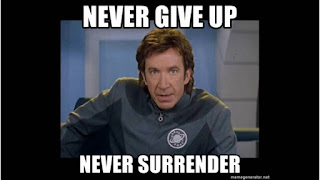
Afew weeks ago, I attended StokerCon – the annual gathering of Horror folk – inSan Diego. A lot of times at conventions, I’m so busy with being on panels andconducting workshops that I end up not getting to talk to many people, whichsucks, because StokerCon is like a family reunion in many ways. But this year,I managed to spend time with a number of friends and colleagues, sometimes onlyin brief conversations, sometimes in much longer ones, and it was wonderful.During two separate conversations – one with Brian Keene and one with RonaldMalfi – we got to talking about writers who had great careers, but for whateverreasons stopped writing. Sometimes they’re simply not productive anymore forone reason or another, but other times it’s like they dropped off the face ofthe Earth.
I began wondering why some writers quitwhile others continue chugging along, regardless of setbacks and self-doubts. Andas a creative writing teacher, I’ve seen people who stop before they really getstarted or who quit along the way. Why do some writing careers fizzle out, andwhat, if anything, can be done to help writers keep doing what they love?
Well, that’s the topic of this blogpost, isn’t it?
Before We Get Started, It’s Okay To . . .
· Try writing,decide it’s not for you, and move on to something else.
· Come back towriting after a period of time away from it.
· Write once ina while.
· Play aroundwith writing for fun, without any intention of publishing your work.
· Take breaksfrom writing whenever you need to.
· Try differenttypes of writing without ever specializing.
There’snothing wrong with exploring writing as opposed to dedicating your life to itas a Sacred Calling. So often on social media, I see people posting that youhave to be 1000% devoted to a writing career and treat it like a full-timebusiness or else you’re not a “real” writer. I think these people confuse“Writer” the identity with “writing” the activity. Writing is something peopledo, and you can do as much or as little of it as you like, and it can play ahuge role in your life (as it does in mine) or a small role. And how muchwriting you do can change with time and circumstance. It’s all good. So yes,it’s okay to quit writing forever, but this blog entry is for writers who wantto keep writing.
Why Do Some Writers Quit Almost Before They Start?
· They like theidea of having produced writing, but they aren’t in love with language andstory. Most writers begin with love of storyand then seek to become writers, but not everyone. Some people think the ideaof being a writer is cool, and then they start exploring writing. It’s kind oflike falling in love first then getting married vs. an arranged marriage. Bothtypes of unions can succeed or fail, they just start at different places. Sowriters who begin with a desire to have the identity of a writer can eventuallyfall in love with the process of writing. I suspect not many, though. My guessis these are the kind of writers who are attracted by the idea of AI writingstories for them.
· They don’tenjoy reading, so they don’t read. Yes,it’s possible to write without being a reader. It’s even possible you’ll writesomething decent. But if you don’t like reading, you probably only like theidea of expressing yourself, and writing seems like a simple, cheap way to dothat. All you need is yourself and something to write with. But if you don’tlove the written word, odds are you won’t stick with writing. Nothing wrongwith that. Maybe you’ll eventually find a mode of self-expression you do love.
· They discoverwriting isn’t as easy as they thought it would be. “But creative writing is supposed to be fun! It’sfreeform expression and anything goes, right?” some students say. It is if allyou want to do is play, and there’s noting wrong with that. But if you decideyou want to write work that’s publishable and that people want to read, you’llneed to work as well. And work isn’t always fun.
· They don’tknow why they’re writing. Having areason for doing something, a purpose you’re trying to fulfill, a goal you’retrying to reach can help you keep going when the work gets hard and youencounter some serious obstacles along the way. If you don’t have a reason towrite, you don’t have a reason to keep going when it gets hard.
· They’reworried about writing the “right” thing. These writers have been told so often that if they want to succeed, theyneed to produce the “right” kind of book (or story, article, poem). So theycan’t decide what to write, and they end up not writing. Or they try a genrethey don’t love because they think they have to, they end up hating writing,and quit.
· They get boredand start a new project. Even if youdon’t have ADD, finding the discipline to see a project through to completion canbe tough. You have to learn not to be attracted to the next pretty-shiny if youwant to finish anything. These writers don’t quit so much as they nevercomplete a piece of writing.
WhyDo Some Writers Quit Early in Their Career?
· Self-doubt: I think most creative people experience self-doubtabout themselves as artists, and for many of us, this self-doubt never goesaway. In order to keep going, we need to learn to live with self-doubt, toexperience it but not let it stop us, to realize there’s reason it’s called self-doubt.It’s a negative function of the ego. We create it ourselves, and – if we can’tuncreate it – we can learn to understand where it comes from and not give itpower over us. If we can’t, we may quit, even if we’re starting to see somesuccess from our efforts.
· Fear offailure: Some writers are so afraid of failurethat even if they finish work, they don’t do anything with it. Even writers whoare starting to establish a career may become so paralyzed by the possibilitythat failure will inevitably strike that they stop writing before it hits. Thetruth is, you will fail, maybe a lot, especially early on. Experiencingfailure, feeling shitty for a while, then getting back to work will help youdeal with the next failure. I think for some people the word failure iscrippling all by itself. Maybe if we thought of failures as temporary setbacksor That-didn’t-work-this-time’s, failure wouldn’t impact us so severely.But some writers never get over their first big failure, and they’re afraid ofexperiencing failure again, so they quit writing.
· Fear ofsuccess: When I first learned about thisconcept a few decades ago, I thought it sounded ridiculous. Who would be afraidof success? That’s what we all want, right? But success means we draw attentionto ourselves and more is expected of us. And if others don’t pressure us tomaintain or increase our level of success, we do it to ourselves. That pressurecan become so overwhelming that we may end up blocked for good.
· Fear ofrejection or difficulty dealing with rejection when it comes. Creative writing students tell me this is theirnumber-one fear about sharing their work, even with classmates and me, letalone sending it out to traditional publishers or self-publishing it. Thesewriters either never send anything out or they quit after one or morerejections. Or if they’re self-publishing, bad reader reviews and – even worse– lack of interest in their work cause them to quit. Rejection of one kind oranother is guaranteed in the writing life, and we have no choice but to learnto deal with it if we want to keep going. I’m at a point in my career where Isell my work regularly, and while I don’t receive rejections as often as I didwhen I first started submitting my work forty-two years ago, it still happens.And yes, it still sucks. But I’ve often had the experience of having a storyrejected a number of times, only for the next editor to think it’s absolutelybrilliant and want to publish it. The story didn’t change. Only the editor did.This has taught me that a rejection just means that a particular person said noto a particular story at a particular time. It means nothing more than that,and it’s certainly not a reason to stop writing if you love it.
· Their workisn’t getting published or only getting published sporadically. Once I began selling short fiction in my mid-twenties,it wasn’t as if I sold multiple stories a year. I was lucky to sell one, maybetwo if I was especially fortunate that year. Those sales were like a drinkwater to a thirsty man in a desert. They might not have been much, but theykept me going a little while longer until the next drink came. Society tells usthat if we aren’t a massive success right out of the gate, we’re a failure andmight as well pack it in. Some people do have fast success. It’s rare, but ithappens. These writers face the problem of maintaining that success andbuilding on it to become even more successful. Usually, their time in the sunis limited. A writing career is a marathon, not a sprint, and you need toaccept that you’re in for the long haul if you want to keep going.
· No reviews orbad reviews. Negative reader response to our workis no fun, but indifference is worse. I’ve produced work that I think is someof the best stuff I’ve ever done, only for it to receive almost no attentionfrom readers. That can be extremely demoralizing, especially after you’veworked so long and so hard to create a piece of work. Why keep going if no onegives a shit about your writing or if they loathe it? Why continue to work hardonly to receive no reward? This is why creating the work needs to be yourfirst, best reward. If you get few reviews or a lot of negative ones, thatdoesn’t change the experience you had of making a story. If we can continue tofocus on art’s true reward – making art in the first place – it can help us getthrough a lot of not-so-fun experiences along the way,
· Progress istaking longer than they thought. Oldpros on convention panels used to say that the first million words werepractice. The late Horror author Alan Rodgers once told me that it takes aboutten years to start publishing regularly. That jibes with my experience. Somewriters don’t take that long, and some take longer. It’s thatmarathon-not-a-sprint thing again. It can be hard to keep going when it seemslike all your effort is getting you nowhere. I think of the famous quote fromthe I-Ching here: “Perseverance furthers.” That’s the only guarantee youget in an artistic life, that if you keep working, you’ll be farther along yourpath tomorrow than you are now. This is another reason why it's important that yourfirst reward be producing the work itself.
WhyDo Some Writers Quit Mid-Career?
You’re publishing your work fairly regularly, readersin general respond to it positively, you’ve been nominated for – and maybe evenwon – an award or two, and you might even be making a little money from writing.But maybe you’re not as far along as you’d hoped by this point, and maybe itlooks like this level of success is all you’ll be able to obtain. It can betough to keep going if you believe you’ve gone as far as you can. Writers inthis situation – or who feel like this, whether or not it’s true – maywell be tempted to quit altogether. There are other specific reasons, too.
· Imposter syndrome:You believe you’re a fraud and any daythe rest of the world will figure it out. You decide you might as well quit nowbefore you’re exposed. Whenever I feel like this, I pull one of my authorcopies off the shelf and flip through it, or I pull up my bibliography on my computerand skim it. Doing these things helps remind me that I couldn’t possibly foolso many editors over the course of so many years. I may also look at somepositive reader reviews on Goodreads or Amazon to remind myself that there arereaders who like my work.
· The Writer’sDisease – Envy: You look around at yourcontemporaries – or worse, younger writers – and envy their successes and beginto resent them (and the world at large). That kind of envy can eat an artistalive until they quit or just stop producing work. I think of it as a kind ofmental/spiritual cancer for writers. Whenever I feel this way, I tell myselfthat the eighteen-year-old kid that I was when I first started out would bethrilled and amazed to see the career I have today.
· Careersetbacks: Publisher folding, agent severing yourbusiness relationship, editor telling you that they won’t be looking at yournext book because the last one didn’t sell enough copies, the book you put yourheart and soul into and are convinced is the greatest thing you’ve ever writtenreceives the worst reviews of your career. . . Any one of these things candemoralize a writer and make them want to give up, and if more than onehappens around the same time, it can be devastating. All of us will experiencecareer setbacks. My first novel deal was canceled by the publisher because they“no longer felt comfortable with the book,” whatever the hell that means. Myagent and I submit work to editors who ghost us (This is a relatively newthing, at least in my experience. How hard is it to send an email that says NO?It’s only two letters, for Christ’s sake.) If you’re already strugglingmentally, emotionally, and financially in your career, any setback could be theone that finally strikes a mortal blow and gets you to call it quits. As I’vementioned before, finding fulfillment in creating the work in the first placecan help you weather setbacks, as will starting to work on something new.
· Unable tobuild a large audience: When you thinkof how many people live on the planet, even bestselling authors are read by asmall percentage of humans. Most people don’t read for enjoyment (and manypeople around the world can’t read or are too busy trying to survive to kickback with a book and relax). Most writers have very small audiences, and whilethey might increase the size of their audience over time, they may reach a pointwhere they’re unable to add more readers. This sucks if you depend on writingfor your income, and it sucks if it makes you feel that your career isstagnating. Whenever I start to feel this way, I ask myself how many people doI need in my audience for it to be worthwhile for me to write something. Ten?Twenty? A hundred? A thousand? I have a day job as a college English professor,so I don’t have to worry about audience size for economic reasons. I do try toremind myself, once again, that the work itself is my first reward. I alsoremind myself to value and appreciate the readers I do have instead ofpining for all the readers I don’t have.
· Promoting morethan writing. In the age of social media, this canbe a real problem. Publishers expect you to promote your work and often theycalculate this into their promotion budget for you. Sometimes that budget iszero because they put the responsibility for promoting solely on you (not thatthey’d ever admit it). Most writers aren’t comfortable trying to hawk theirwares 24/7 on the internet, and doing so can wear them down emotionally or, ifthey don’t manage to promote often, make them feel like a failure. They end uppromoting more than they write, and they quit because what’s the point ofhaving a goddamned writing career if you don’t get to do any fucking writing? Itry to keep my promotion balanced with my writing. The writing comes first,because without it, I have nothing to promote. I have a few social mediaaccounts, a website, an Amazon page, this blog, a newsletter, and a YouTubechannel. I try to regularly promote on social media, but only once a day, ifthat. I also post other types of content so readers don’t get sick of me, and Irepost other writers’ promotional messages to be a good literary citizen. Thebasic rule of thumb I’ve seen is that you should put out three non-salesmessages for every sales message you post. As for my newsletter, blog, andYouTube channel, I try to post new content at once a month (but I often don’t havethe time). Common wisdom is you should post content once a week, but there’s noway I can do that and still write as much as I do, so I don’t worry about it.Again, the writing comes first. And if you can’t write and promote because ofyour overall life/work schedule, then screw promoting. Write and enjoy writingand let the other aspects your career take care of themselves. Writing – notpromoting – is why you got into this gig in the first place. Don’t ever losesight of that.
· Promotionalefforts don’t seem to work. Thesecret of promotion is that no one – including mega-corporations – has any ideaif specific promotional efforts actually work. And ones that do seem to workone time can fail utterly the next. It’s a crapshoot. You can increase yourodds of success by learning more about promotion, but you’ll never be able toguarantee success. (Unless you write a diet book, self-help book, orhow-to-have-better sex book.) Try not to worry too much how successful yourpromotional efforts are, because no matter what you do, you’ll never reallyknow. So promote and hope for the best, and like I said above, don’t letpromotion overwhelm – and even take the place of – your writing.
· Not makingmuch (or any) money. My second agent once told me that “Noone goes into this business to make money.” If you want to make money inAmerica, become a doctor or a lawyer. (Or a corrupt politician.) Writing – notcounting technical and business writing – begins with a need for creativefulfillment. We seek money from our writing so we won’t have to work asoul-sucking non-creative job. That way, we’ll have more time to write. So ifyou’re a writer, you’re almost guaranteed to make little-to-no money from yourwork, and what income you do have will be sporadic and unstable. Living a lifeof economic uncertainty can wear anyone down over time, and if you have healthproblems – especially as you age – it can be a nightmare. Healthcare is hellaexpensive in the U.S.A., and a lot of writers’ strategy for dealing with healthissues is to hope and pray that they’ll never get sick. Even if they have acondition that won’t kill them, if it’s a painful one and they can’t affordtreatment, the pain will make it difficult, if not impossible, to work. When Iwas in my twenties, I was on GEnie, a message board service that was like aproto social media service. Lots of professional writers were on there, andthey posted stuff about living the writing life that I’d never read ininterviews before, and one of those things was how difficult it was to be poor,even if you were regularly publishing and winning awards. A lot of thosewriters said they weren’t producing any more work than they did before theybecame full-time writers because they were depressed or in ill health. That’sone of the reasons I got a day job and have kept it all these years. I’m luckythat my job still allows me time to write, and that I’m generally a fastwriter. But establishing a writing career is hard enough without having to constantlyworry about the wolf at the door.
· No recognitionfrom readers and critics. Every yearwhen people start posting “best-of” lists on social media (or lists of favoritewriters or writers you should be reading), writers lament about how their namenever appears on those lists. They also complain about how few reviews they getin Publisher’s Weekly or Booklist, or on Goodreads and Amazon,and how few – if any – reviews they get in magazines like Fangoria, RueMorgue, HorrorHound, etc. Feeling unappreciated, or even invisible, can causeany writer to consider quitting. What’s the point of producing work if no onegives a shit about it? I try to counter this feeling by saving some of thepositive reviews I do get by taking screenshots of them. Whenever I start tofeel like I might be invisible, I pull up a couple and remind myself that yes,there are readers and reviewers who do see me. It helps.
· Winning noawards. Every award season, writers getdepressed because they’re never nominated or if nominated, never win. Often,I’ll see writers post a sour grapes message on social media about how allawards suck and how the specific award they weren’t nominated for sucks the most.(But if they ever win one, they never criticize awards again.) This is Envyrearing its toxic head again, plus, in a capitalistic society, competition iseverything. You have to have losers in order for there to be winners, and youhave to have winners otherwise how would we ever know what the hierarchy ofsociety is? I’ve won a few awards, and I feel honored by them all. But I alsotry to remind myself that an award doesn’t mean I’m officially One of theGreatest Writers of All Time. It simply means that a certain group of peoplechose to honor certain literary works at a certain point in time. Awards areyour peers acknowledging that you do good work, and nothing more. (They don’tneed to be more; appreciation from your fellow artists is more than enough!) Theycan be used for promotion, sure, but that’s a side benefit. And it’s arguablehow much help they are in promotion. As I keep saying, try to find fulfillmentin creating the writing itself and knowing that you have readers (however many)that think you and your work are awesome.
· Not getting TVor movie deals. Envy again. I’ve never had a movie orTV deal (although I’ve had some nibbles), and I do my best not to be enviouswhen other writers announce their deals. Again, I remind myself that the youngme would be thrilled to have the career I have now, and it helps. Besides, if Iwanted to make movies or TV shows, I would’ve gone into those fields. I want towrite fiction.
WhyDo Some Writers Quit After a Long Career?
Ithink the following list is mostly self-explanatory, and most of the items arechallenges of aging in general applied to a writing career. I turned sixty thisyear, and I’ve started to feel some of the issues below. I remind myself aboutenvy again, try to focus on what I really wanted from my career (to write andto grow as a person and artist), and I remember the kid writer I used to be.
· Disillusionmentwith the publishing industry.
· Seeing youngerwriters having earlier and greater success than they did.
· Their careerdidn’t reach the heights they’d hoped for.
· Fearing theirbest days artistically are behind them.
· Feelingforgotten.
· They’re tired.
HowNOT to Quit
If you’re truly determined to quit writing, no one canstop you. And as I said at the outset of this long entry, it’s okay if you dowant to quit. But if you’d like to keep going, here’s some advice from someonewho’s considered quitting more than once in his forty-year career.
· Don’t letothers define your writing career.Don’t accept anyone’s paradigm for what a writing life should be but your own.You don’t have to make a living at it, you don’t have to be an award-winner,you don’t have to have a zillion followers on social media, you don’t have towrite in a certain genre, etc. If you try to follow a path someone else haslaid out for you, you’ll be miserable and eventually feel like a failure.Create and follow your own path, and you’ll be more likely to go the distanceas a writer.
· Understand whyyou write. Figuring out what you want most outof your writing will help you achieve it (or at least work toward it). Ifyou’re fulfilling your artistic and personal needs, you’re less likely to quit.
· Allow the actof writing to be fulfilling in and of itself. I’ve mentioned this several times already, but it’sworth mentioning one last time.
· Accept you’regoing to feel negatively about your career from time to time. Don’t give thesefeelings more power. Whenever I start to (figuratively)hear voices telling me I’m a lousy writer, I’m a failure, I’ll never be as goodas I want to be, I remind myself that those voices lie. They’re just my doubtsand fears speaking, but what they’re telling me isn’t true. I’m more successfulat this some days than others, but it helps a lot overall.
· Accept thatyour career can never live up to the heights of your imagination, and that’sokay. Our imaginations have no limits, butreal life does. I’d love to be ten times successful than Stephen King (or evenhis rip-off doppelganger on Amazon, Stephen R. King), but that’s not realistic.Shit, it’s not even within the realm of possibility. It’s okay to imagine morefrom your career, to want more and strive for more. But don’t think you’re afailure for only achieving what you can in the time you have in this world.
· Avoid burnout:Rest when you need to. Have interests aside from writing. I suck at this. I love writing and teaching writing, Ilove reading, and I love movies. Primarily Horror, but I love SF/F andmysteries, and superheroes, and interesting documentaries and nonfiction series(not reality shows, though) as well. I’ve never understood hobbies. Ilong ago figured out what I liked and I’ve devoted my entire life to it. Ihaven’t experienced burnout yet, so hopefully I’ll keep going like this until Idie. But I think it’s probably healthier to take rests and have a life outsideof writing. I guess this is a “Do as I say, not as I do” piece of advice.
· Connect with awriting community. Having friends who understand you,support you, and commiserate with you in ways non-writers will never be able tois huge. It’s a vital survival tool for writers, whether your communityis in your town or online. Sadness and depression thrive on loneliness. Letyour writing brothers and sisters be there for you when you need it, and you bethere for them.
· Try new things. Try a new genre or a different craft technique (likewriting an epistolary story or a story in second person). Write a poem oressay. Try ghostwriting. Try anything and everything when you start to feellike quitting. Either you’ll return to your work refreshed and ready to go, oryou may find a new kind of writing that you want to focus on for a while.Either way, you’re less likely to stop writing altogether.
· Try to enjoywhat your career is instead of obsessing on what it isn’t. This doesn’t mean you shouldn’t continue trying toadvance your career and further your learning as an artist. But if you’realways focused on tomorrow, you’ll miss the joys of today. And those joys arewhat feed us and keep us going.
· Give back. Volunteer for a writing organization you belong to.Teach a writing class or workshop at a conference, your local library, or a reccenter. Mentor new writers. Giving back helps us find deeper meaning andsatisfaction in our careers, especially as we get older.
· Focus onliving a creative life. When I waseighteen or nineteen, I asked myself what my true goal was as a writer, and Irealized that what I wanted more than anything was to live a creative life. Andthis is my ultimate weapon whenever I feel down about my writing career andthink I should probably hang it up. I wanted to live a creative life, andthat’s exactly what I have done for over four decades. I’ve succeeded at that, andI continue to succeed every day. So what if I get a rejection, don’t win award,don’t make a best-of list, get few reviews, no reviews, or bad reviews? I’vealready succeeded. And you can, too.
Andif all else fails . . .
Just Keep Writing
· Even when youdon’t feel like it, even if it’s like pulling teeth, even if you think whatyou’re producing is garbage.
· So manyproblems writers face can be dealt with, one way or another, by simply engagingin the act of writing.
· If you want tohave a long career as a writer, and keep from quitting when the going getshard, focusing on producing writing is the best way to ensure you stay thecourse.
Sowhether you’ve quit writing and are contemplating returning to it, you’rethinking about quitting, or if you’re concerned that some day you might sufferburnout or disillusionment and finally throw in the towel, hopefully, I’vegiven you some ideas to – as Dory says in Finding Nemo – “Just keepswimming, swimming, swimming.”\
Thatlittle fish is a lot smarter than she seems.
DEPARTMENT OF SHAMELESS SELF-PROMOTION
Old Monsters Never Die
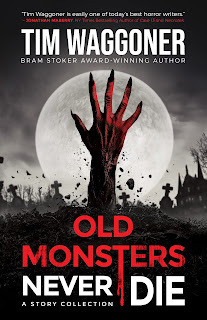
Like horror? Like short stories? I got what you need!
My eighth fiction collection – Old Monsters Never Die – came out May 28from Winding Road Stories.
From the mind of four-time Bram Stoker Award winnerTim Waggoner comes 18 provocative tales of terror that explore the darkestcorners of the human mind. This comprehensive collection concludes with anunforgettable metafictional story on what it takes to be a horror writer. Withthis carefully curated selection of short stories. discover why no matter howmuch we try, in our deepest subconscious, Old Monsters Never Die.
Available in paperback and eBook editions.
Amazon Paperback: https://tinyurl.com/59yny48s
Kindle: https://tinyurl.com/5b3etxts
B&NPaperback: https://tinyurl.com/352a9nzx
The Atrocity Engine
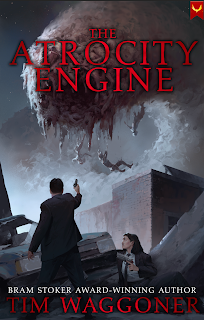
TheAtrocity Engine,first in a series of horror/urban fantasy novels for Aethon Books called TheCustodians of the Cosmos, has been getting great reviews!. The secondnovel, Book of Madness, releases July 30th, and theconcluding volume, The Desolation War, comes out Oct. 30th.
TheMaintenance novels take place in the mythos I’ve been developing since my novelThe Harmony Society came out in 2003. If you want to learn more about mymythos, you can check out this previous blog entry: https://writinginthedarktw.blogspot.com/2022/12/twenty-years-of-waggoner-mythos.html
(Don’tworry, though. You can read the Maintenance novels without having read any ofmy other work.)
Menin Blackmeets Hellraiser in this rollicking mash-up of urban fantasy and cosmichorror from four-time Bram Stoker Award-Winning author Tim Waggoner.
Creaturesfrom dark dimensions infesting your home? Demonic beings trying to drive youinsane? Alien gods attempting to destroy your universe?
Justcall Maintenance.
Thisunderpaid and overworked secret organization is dedicated to battling forcesthat seek to speed up Entropy and hasten the Omniverse’s inevitable death.
NealHudson is a twenty-year veteran of Maintenance. A surveyor who drives throughthe streets of Ash Creek, Ohio constantly scanning for the deadly energy knownas Corruption. Since the death of his previous partner, Neal prefers to workalone, and he’s not happy when he’s assigned to mentor a rookie.
Butthey better learn to get along fast.
TheMultitude, a group of godlike beings who seek to increase Entropy at everyopportunity, are creating an Atrocity Engine. This foul magical device candestroy the Earth, and they don’t care how many innocent lives it takes tobuild it. (Spoiler alert: It’s a lot!)
Justanother day on the job. . .
“Waggoner offers a fresh variation on the trope of acovert agency combating evil in his blood-drenched Custodians of the Cosmosseries opener.” – Publishers Weekly
“This gripping dark fantasy boasts an indelible castand an unwavering pace.” – Kirkus Reviews
"THE ATROCITY ENGINE is a wild ride full ofentertaining scenarios and scary monsters!" – Booklist
“THE ATROCITY ENGINE is a kick-ass cross-genrethrill ride of a novel! Holy moly! Tim Waggoner is easily one of today’s besthorror writers.” – Jonathan Maberry, NY Times bestselling author of CAVE 13 andNECROTEK
"This is edge-of-your-seat Horror Fantasy. It'sas if Stephen King wrote MEN IN BLACK!" —Scott Sigler, #1 NYT Bestsellingauthor of EARTHCORE
“Fast-paced, cleverly thought-through, and deeplyunnerving in all the right places—urban horror fantasy with a decidedly creepydifference. Don't read it in the dark!” – Diane Duane, New York Timesbestselling author of TALES OF THE FIVE: THE LIBRARIAN
B&NHardcover: https://www.barnesandnoble.com/w/book/1144299910?ean=9781949890891
Lord of the Feast
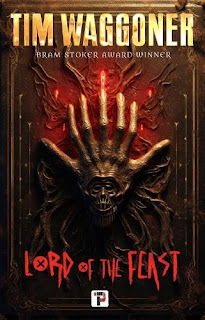
Mymost recent horror/dark fantasy novel for Flame Tree Press came out in April.
Twentyyears ago, the Shardlow family attempted to create their own dark god – andthey failed. Now they’re ready to try again . . .
Checkout this cool review video the good people at Flame Tree Press made for Lordof the Feast!
https://www.youtube.com/watch?v=R-6apaQI7Rs
“Lord ofthe Feast is an entertaining mix of bloody horror and honest emotion and awelcome return to the surreal, gruesome horror hijinks that Waggoner’s longtimefans know and love.” – Considering Stories
“Lord of the Feast is sure totake the reader down a dark rabbit hole into a twisted wonderland filled withcharacters from the darkest of nightmares and fans of dark fiction are sure tolove it.” – A Reviewer Darkly
https://www.flametreepublishing.com/lord-of-the-feast-isbn-9781787586369.html
Barnes & Noble Paperback: https://www.barnesandnoble.com/w/lord-of-the-feast-tim-waggoner/1143636012?ean=9781787586369
Barnes& Noble eBook: https://www.barnesandnoble.com/w/lord-of-the-feast-tim-waggoner/1143636012?ean=9781787586376
Audiobook Sale
Audible versions of some of my booksare on sale at Amazon until 9/16/24! You can find them here: https://www.amazon.com/s?k=tim+waggoner&i=audible&crid=2UB4IZSPVIKVW&sprefix=tim+waggoner%2Caudible%2C115&ref=nb_sb_noss_2
The books include: The Way of AllFlesh, Eat the Night, The Last Mile, Love, Madness, and Death (a novellacollection), The Winter Box (Bram Stoker Award-winner), The MenUpstairs, (Shirley Jackson Award finalist), A Kiss of Thorns (BramStoker Award finalist), and Dead Detectives Society (I have a newNekropolis story in this anthology).
Eat the Night features the first appearance of Maintenance, theentropy-battling agency in The Atrocity Engine.
Teeth of the Sea eBook Sale
The Kindle version of mycreature-feature novel Teeth of the Sea is currently on sale for 99cents! I have no idea how long the sale will last, so snag a copy before theprice goes back up.
They glide through dark waters, sleekand silent as death itself. Ancient predators with only two desires – to feedand reproduce. They’ve traveled to the resort island of Las Dagas to do both,and the guests make tempting meals. The humans are on land, though, out ofreach. But the resort’s main feature is an intricate canal system . . .
. . . and it’s starting to rain.
SCHEDULED APPEARANCES
In Your Write Mind. June 27th to June 30th. Greensburg,Pennsylvania.
IGW Genre Con. August 17th and August 18th.Huntington, West Virginia.
Authorcon V. March 28th to March 30th.Williamsburg, Virginia.
StokerCon. June 12th to June 15th.Stamford, Connecticut. I’m one of the Guests of Honor!
WHERE TO FIND ME ONLINE
Newsletter Sign-Up: https://timwaggoner.com/contact.htm Website: www.timwaggoner.com Amazon Page: https://www.amazon.com/stores/Tim-Waggoner/author/B001JP0XFM?ref=ap_rdr&store_ref=ap_rdr&isDramIntegrated=true&shoppingPortalEnabled=true Blog: http://writinginthedarktw.blogspot.com/ YouTube Channel: https://www.youtube.com/c/timwaggonerswritinginthedark Facebook: https://www.facebook.com/tim.waggoner.9 Instagram: tim.waggoner.scribe
May 1, 2024
Forty Years as a Writer: Lessons Learned
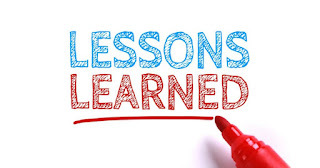
Well, forty-two, actually. I was eighteenwhen I decided to dedicate my life to writing, and I’m sixty now. This seemedlike a good time to take a look back and pass along some of the most importantthings I’ve learned about writing and publishing over the course of my longcareer. I mean, I guess it’s long. Seems like I just started yesterday, but oldpeople always say stuff like that, don’t they? The following items aren’t inany particular order. I wrote them as they came to me. If you’re a long-timereader of my blog, you may have encountered some of the following in previousposts, but hopefully most should be new to you.
· Take your writingas far as you can. Ipass along this advice all the time. When I was nineteen and a collegeundergrad, the teaching assistant who taught my composition class – Pam Doyle –held end-of-the-course conferences with students. During my conference, shesaid, “I urge you to take your writing as far as you can.” This is the bestwriting advice I’ve ever received. Pam didn’t say “Publish a zillion books” or“become a bestseller.” She told me to continue writing and growing as a writer.And her advice was open-ended. It had no end point. I can continue taking mywriting as far as I can until they day I die (which is my plan!).
· I never argue withpeople’s opinions about my work. I learned this from science fiction writerMike Resnick at an SF convention. He was talking about whether writers shouldrespond to reviewers, and his view of readers’ or critics’ reactions to hiswork as “opinions” is exactly the right attitude. You can’t argue with anopinion – it is what it is – so why bother? It also speaks to how we should takereviews of our work, both the good and the bad. They’re just someone’sopinions, not divine judgments from on high.
· Scene and Sequel. I first learnedabout this technique from pro writers discussing it on convention panels thirtyor so years ago. They presented it as the technique to master if youwanted to write publishable popular fiction. They said they’d learned it from ahow-to book by Dwight V. Swain called Techniques of the Selling Writing.As soon as I could, I hauled ass to the closest bookstore, found a copy, boughtit, took it home, and devoured it. Rather than give you a short explanation of thetechnique here, I’ll link to the Wikipedia entry that discusses it: https://en.wikipedia.org/wiki/Scene_and_sequel
· Listen to myinstincts. Thefirst story I sold to a professional-level market was “Mr. Punch,” whichappeared in the anthology Young Blood from Zebra Books in 1994.This is the story I think of as the first true “Tim Waggoner” story, the firstof the surreal/nightmarish type of horror tales that I’ve become known for. Theending was very abstract and symbolic, and when I read the story to my writers’group, they advised me to make the ending clearer. I felt they were wrong, butI tried anyway, but no matter how I tried to revise the ending, I knew myoriginal version was best. I submitted it to Young Blood, it wasaccepted, and when it was published, it was well received by the horrorcommunity. It made the Honorable Mention list in the Year’s Best FantasyHorror, too. I didn’t disregard all feedback after this experience, but ittaught me to pay attention when my inner author’s voice says, “Yeah, this storyis weird and messed-up, but that’s the way it’s supposed to be.”
· Don’t tell peoplehow to view or enjoy my work. During an undergrad creative writingclass, I read aloud a chapter of a novel I was working on for feedback. Thebook was a fantasy adventure featuring mythological gods ruling a Mad Max-typewasteland. I was writing the book on two levels – one was as an adventurestory, but another was as a satire of adventure stories. I wanted the satire tobe very subtle, though. I read the chapter, which featured an action sequence.Afterward, I explained the satirical aspect of the book, and one of thestudents said, “Now I feel bad for enjoying it.” I realized then that it’s notmy place to tell people how to read or respond to my work. Stories are likejokes. They should explain themselves in the telling. Sometimes in interviewsI’ll talk about the different layers of my stories, but in general, I writethem and then shut the hell up while readers read them.
· The Rule of Twelve.Backbefore the advent of a little-known fad called the Internet, we writers used toget market information from print sources. Writer’s Digest Books’ annual Writers’Market was the go-to source, and I’d buy a copy every year. The front ofthe book always had articles on writing and submitting your work, most of whichI skimmed or ignored entirely, since they covered stuff I already knew. But oneyear I ran across an article titled “The Rule of Twelve.” (I wish I couldremember who wrote it.) The author talked about how after one of her storiesgot a couple rejections, she figured it was no good, put it away, and startedwriting something new. I thought, “Hey, I do the same thing!” One day shedecided she was going to send her stories out until they sold, no matter howlong it took. She eventually discovered that her stories sold, on average, tothe twelfth market she tried. After employing this technique, she began sellingher stories regularly. I decided to try the same thing, and I sold my stories,on average, to the ninth market I sent them. Eventually, I began sellingthem on the first or second time out. What I love about The Rule of Twelve isthat it’s a way to codify persistence that doesn’t require any emotional effort,so even if you’re depressed by a rejection, you know you’re supposed to keepsubmitting your work, so you do. I advise all writers to give The Rule ofTwelve a try!
· Do an ego checkwhen dealing with editorial comments/changes. I haven’t been ina writers’ group for close to thirty years now, and I don’t use beta readers. Irely on my agent and my editors to give me feedback on my work. (I dotraditional publishing, so these are editors at publishing houses, not ones Ihire.) Since they’re professionals, I do my best to keep a tight reign on myego (or on my natural laziness when it comes to revision) when my initialimpulse is to say, “Screw you, it’s perfect the way it is!” Yeah, I know I said“trust your instincts” earlier, but trust doesn’t mean ignorefeedback completely. If, after careful consideration, an editorialsuggestion doesn’t seem right to me, I’ll discuss it with an editor or my agentand see what we can work out. But I work hard to truly consider suggestionsinstead of dismissing them out of hand merely because I hate revising.
· “All Americanwriters are regionalists.” As an undergrad, I worked in my university’s WritingCenter, and a co-worker asked to read one of my short stories. I chose acontemporary fantasy with a surreal/symbolic ending that was a precursor tostories like “Mr. Punch.” My co-worker asked me where the story was set. I toldhim I didn’t identify the setting beyond it being a lake with a campgroundnearby. I wanted the setting to feel universal to readers. My friend said thatI had to precisely identify the setting because I was an American writer, and“all American writers are regionalists.” I immediately recognized that he wasparroting something he’d learned in a lit class as if it was law. I told him itdidn’t matter exactly where the story was set. He read it, then said, “You wereright about the setting.” From this, I learned not to pay too much attention topeople when they try to tell me the “rules” of writing – especially rules theylearned from a college lit professor. Yes, there are techniques that tend towork for most readers more often than not, but these are more customs than theyare rules. I tell students that there’s only one real rule in writing: You mustuse marks on a page (or screen) to communicate ideas. Everything else issituational based on your purpose and audience.
· Don’t compareyourself to other writers. When I was in grad school, other students would talkabout wanting to write, but they always compared themselves to the writers theywere studying in their classes, feeling like they could never possibly measureup to The Greats. And so they never wrote anything. Learning from otherwriters is essential. I learn something from every writer whose work I read.But if you compare your work to theirs, you’ll always find yourselfwanting. Run your own race, and don’t worry about who’s ahead of you or behindyou. We run the race because the race is good to run, because we have torun it, we can’t imagine living without running it. The running is theentire point of the race.
· Strength-Basedapproach.Years ago, I read an article in Writer’s Digest written by Isaac Asimov.In it, he talked about how he was really good at plotting stories but sucked atwriting well-developed characters. Instead of wasting a lot of time trying toget better at writing characters (which he doubted he’d ever improve much on),he decided to focus on his main strength – plotting – and work to improve thatas much as possible. Many years later, this would become known as a strength-basedapproach. You focus on maximizing your strengths while getting just okay atareas you’re weak in. Some writers are strongest in plotting, some in style,some in dialogue, some in research, some in humor, some in generating ideas(this is me!), and so on. The more you lean into your strengths, the stronger –and more competitive – your writing will become.
· Don’t keep yourdistance from fans – unless you need to. In the mid-1990s, a friend of minenamed Ron Sarti sold a fantasy trilogy to Ace Books. We’d been going to SFconventions for years, but once the first volume in his trilogy came out, Ifelt uncomfortable seeing him talk to fans at cons as if – gasp! – they were equals.This was a subconscious thing on my part, and it took me a while to figure itout. I’d seen so many pros keep their distance from fans over the years thatI’d come to view this as professional behavior. Since Ron had reached prolevel, he should’ve acted like a pro, right? Once I understood where thisfeeling came from, I got over it quickly. Sure, some writers might –consciously or subconsciously – think they’re better than fans, but I thinkmore writers are simply introverts that aren’t comfortable interacting with alot of people at events, and so they keep to themselves or go hide in the baror their hotel room when they need some alone time. Other writers are so famousthat they’d be mobbed by fans wherever they went at a con, so they need to keeptheir distance to avoid getting overwhelmed. I’m an introvert, but I don’t goto cons to stay away from people. If I wanted to do that, I’d stay home. WhenI’m at a con, I always try to remember how Ron behaved, as if there was nothingseparating him from the fans, because, of course, there wasn’t. We’re allpeople, gathered to celebrate something we love – writing and reading.
· Editors work forthe publisher, not for writers. Editors work with writers. Business-wise,editors are not your friend. They always represent the company’s interests, notyours. (This is less true for small-press editors who often are thecompany.) Artistically, they can be your friend, and they can be your friendoutside of business matters (like when hanging out at a con). I’ve had book editorslie to me about advances (“This really is as much as we can offer right now”)when I know they’ve given higher advances to other writers. You can choose tohave an adversarial relationship with editors and assume they’re always out toscrew you, but that’s not true, and it’s certainly not helpful. I think it’sbest to go into a relationship with an editor knowing the business and artisticaspects of it are two different – and often mutually exclusive – things.
· Write with a closeidentification with a character’s point of view. Movies andvideogames can deliver images and sound. But only fiction can put people intothe heads of characters, allowing them to experience the story more deeply andintimately. Too many beginning writers write as if they’re passive audiencemembers watching their story play out on a screen before them. Write yourstories as if you are the character living them, so you can give readers thesame experience.
· Family and friendswon’t become readers if they aren’t already. Your family and friends may beproud of you and talk up your writing to people whenever they get a chance. Butthat doesn’t mean they’ll read everything – or even anything – you write.People don’t change their reading tastes if they love you, and they don’tsuddenly become readers if they aren’t readers already. I once gave my sister acopy of one of my earliest novels. During a visit to her place, I found itlying on the kitchen floor next to the cat food bowl. Gary A. Braunbeck oncetold me of visiting a relative’s house to find them using one of his books tohelp prop up their coffee table. I don’t offer to give family members copies ofmy book anymore, and they never ask. I don’t resent them for it, though.
· You’ll never be an“expert.” Yearsback (seems like I’m starting most of these items with that sort of phrase), Isaw a writer who’d gotten her first small-press book contract suddenly startgiving everyone advice on the Horror Writers’ Association’s members-onlymessage board. She’d never given out any advice before, but once she’dsigned a contract, she acted as if she was the expert on all mattersrelated to writing and publishing. Who knows? Maybe she was just so excited tofinally land a deal that she was eager to interact with people. Maybe it gaveher the confidence to share ideas about writing that she’d previously kept toherself. But I always think of her whenever I’m tempted to believe that I KnowIt All. I’ll never learn everything there is to learn about writing andpublishing as long as I live. My goal is to learn as much as I possibly canbefore I die. Plus, it’s always useful to keep a beginner’s mind. That’s how westay excited about our craft as the years go by, and that’s how we grow.
· I can’t tell whowill “make it” as a writer. I can recognize when someone demonstrates writingtalent and ability, and I can tell when they have a natural feel for storytelling.But I have no way of knowing how hard they’re willing to work to develop theirskills, and if they’ll be mentally tough enough to keep going despite all theobstacles and setbacks they’ll encounter. Someone whose writing doesn’t lookvery promising today can work their ass off for years and become a skilledprofessional. Someone else with a shit-ton of natural talent may not do a damnthing with it throughout their life. There’s simply no way for me to know.
· You’re going toget your heart broken, probably multiple times. Rejections, dealsthat fall through, bad reviews (or worse, complete indifference from readers),being nominated for awards and not winning, never appearing on theend-of-the-year best lists, never having your work selected for Best-Ofanthologies, never getting film and TV options on your work, seeing writersyounger than you being catapulted to financial success and critical acclaimwhile you’re still struggling all these years later . . . There’s a reason whyyou need thick, adamantium-tough skin to be a writer. You’ll have lots ofpositive experiences, too, but you need to make peace with the fact thatsometimes you’re going to hurt, and maybe hurt bad. In this way, a writingcareer is like life itself. You need to find a way to take a hit – sometimes anextremely hard one – and keep going.
· Some people willglom onto you as their private unpaid teacher. Some beginningwriters seek out pros to attach themselves to in order to get free feedback andcareer advice. I’m not talking about people who ask you a few questions everynow and then, or who ask if you’ll read a short story or a novel chapter forfeedback. I’m talking about needy, almost desperate people who want you to givethem everything all the time. Of course, you can choose to help whoever youwant, however much you want. At this point in my career, if I said I’d readpeople’s work for free, I’d have so many takers that I’d never get to doanything but read and critique others’ writing. I teach creative writing at mycollege, and I volunteer as a mentor in the Horror Writers Associationmentorship program. Otherwise, I do my best to protect my writing time. If Ididn’t, I wouldn’t have any.
· Some people willuse you as a stepping stone. Some new writers befriend you for a timeuntil they can move on to another writer who’s farther up the ladder of successthan you are. Afterward, they may never interact with you again in any way.It’s like you no longer exist to them. Some may say hi if they see you at acon, but they won’t spend any time with you. It’s funny to watch them on socialmedia as they comment on a writer’s posts and give them shout-outs and praisetheir work until they latch onto a bigger writer. It would be easy to becomejaded and cynical and assume every new writer who approaches you only wants touse you. I get that. I choose to believe that any writers who approach me aregenuinely interested in getting to know me, and if they eventually toss measide without a second thought as they move on to someone they consider abigger, more useful writer, I try not to let it bother me. I’m sad forthem because this kind of career climbing in the writing world rarely, if ever,works. You don’t become a better writer by cynically using other people. And youend up with a reputation as a career climber without having built a truenetwork of friends and colleagues. You end up alone, and usually no better offcareer-wise than where you started.
· More writing is (often)the solution to writing problems. Life circumstances aside – illness,depression, new baby, new job, recovering from surgery, etc. – I think writers’block is really writing avoidance. There’s some reason why you don’twant to – or are afraid to – work on a piece of writing. The solution is towrite anyway (even if it’s on a different project) and to keep writing untileverything starts flowing smoothly again. Sometimes I’ll have students who saythey write better under pressure. I tell them this is an illusion. “You writebetter because you’re actually writing. You breathe better when you breathe,you eat better when you eat, you sleep better when you sleep. It’s the samething. You’re writing better because you’re finally writing.”
· You will neverstop doubting yourself. Get to work anyway. This one doesn’t need muchelaboration. There will not come a magical day when all the negative thoughtsabout yourself and your writing disappear forever. Just don’t let thosethoughts stop you. As I always tell students, “Remember: Those dark voices alwayslie. They may speak, but you don’t have to listen to what they say.”
· Write the storiesonly you can tell. Iread an article by Dean Koontz in Writers’ Digest some years ago(there’s that phrase again!) in which he said the only thing writers reallyhave to sell – or perhaps, the best thing they have to sell – is theirunique vision. He used himself as an example. He started out writingrun-of-the-mill science fiction novels, but he eventually shifted to writinghis combo of horror/suspense/science fiction, and that’s when he started tohave significant success in his career. It’s a simple transition to make. Weall start out by imitating our favorite writer or by trying to figure outwhat’s most marketable and producing that. And trying to figure out your“unique vision” isn’t easy. It takes time, experimentation, exploration, andself-reflection. And it helps if you’ve gotten enough feedback on your work tostart to get an idea of what elements readers particularly enjoy or respondmost strongly to. I can write a lot of different things, but I’ve had the mostsuccess with my weird-ass horror novels, my action/character/humor- orientedurban fantasy, my media tie-in books, and my nonfiction books about writinghorror. But it took time and my trying different types of writing to get there.
· It’s all worth it.Everysacrifice I’ve made for my writing, every hardship I’ve had to deal with, everyobstacle I’ve had to overcome, everything I had to learn, and every way I hadto grow (sometimes painfully) for my writing has been worth it.
· The most importantthing to give a hero. I learned this from SF legend Lois McMaster Bujold, acouple decades ago when we were in the same writing group. “What’s the mostimportant thing to give a hero? Pockets.” This is one of the wisest pieces ofwriting advice I’ve ever received.
These aren’t all the lessons I’ve learnedin forty-two years, of course. I actually had a number of other items on myoriginal list for this blog entry, but it was getting so long, I trimmed it down.But these are some of the most important, and the ones that I hope willbe most useful to you.
Now go learn more lessons, and when thetime comes, pass them on.
DEPARTMENT OF SHAMELESS SELF-PROMOTION
The Atrocity Engine is Unleashed Uponthe World!
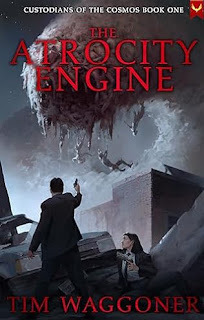
Myhorror/urban fantasy novel, The Atrocity Engine, was released this week,and so far, the reviews have been overwhelmingly positive. It’s the firstvolume in the Custodians of the Cosmos series, and the other two – Book ofMadness and The Desolation War – will be released on July 30thand October 30th respectively.
Creaturesfrom dark dimensions infesting your home? Demonic beings trying to drive youinsane? Alien gods attempting to destroy your universe?
Justcall Maintenance.
Thisunderpaid and overworked secret organization is dedicated to battling forcesthat seek to speed up Entropy and hasten the Omniverse’s inevitable death.
NealHudson is a twenty-year veteran of Maintenance. A surveyor who drives throughthe streets of Ash Creek, Ohio constantly scanning for the deadly energy knownas Corruption. Since the death of his previous partner, Neal prefers to workalone, and he’s not happy when he’s assigned to mentor a rookie.
Butthey better learn to get along fast.
TheMultitude, a group of godlike beings who seek to increase Entropy at everyopportunity, are creating an Atrocity Engine. This foul magical device candestroy the Earth, and they don’t care how many innocent lives it takes tobuild it. (Spoiler alert: It’s a lot!)
Justanother day on the job. . .
“Waggoneroffers a fresh variation on the trope of a covert agency combating evil in hisblood-drenched Custodians of the Cosmos series opener.” – Publishers Weekly
“Thisgripping dark fantasy boasts an indelible cast and an unwavering pace.” – KirkusReviews
"THEATROCITY ENGINE is a wild ride full of entertaining scenarios and scarymonsters!" – Booklist
“THEATROCITY ENGINE is a kick-ass cross-genre thrill ride of a novel!”– JonathanMaberry, NY Times bestselling author of CAVE 13 and NECROTEK
"Thisis edge-of-your-seat Horror Fantasy. It's as if Stephen King wrote MEN INBLACK!" —Scott Sigler, #1 NYT Bestselling author of EARTHCORE
“Fast-paced,cleverly thought-through, and deeply unnerving in all the right places—urbanhorror fantasy with a decidedly creepy difference. Don't read it in the dark!”– Diane Duane, New York Times bestselling author of TALES OF THE FIVE:THE LIBRARIAN
B&NHardcover: https://www.barnesandnoble.com/w/book/1144299910?ean=9781949890891
NewShort Story Collection Up for Preorder
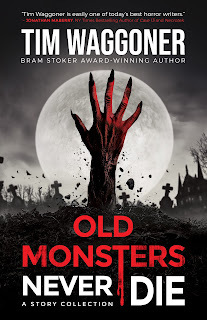
My eighth short story collection, Old Monsters NeverDie, will be coming out from Winding Road Stories on May 28th.It collects stories I wrote from 2017 to 2019.
From the mind of four-time Bram Stoker Award winnerTim Waggoner comes 18 provocative tales of terror that explore the darkestcorners of the human mind. This comprehensive collection concludes with anunforgettable metafictional story on what it takes to be a horror writer. Withthis carefully curated selection of short stories. discover why no matter howmuch we try, in our deepest subconscious, Old Monsters Never Die.
“Tim Waggoner is easily one of today’s best horrorwriters.” – Jonathan Maberry
“His style is very unique — evocative enough to standquietly with Charles Grant but visceral enough to punch with Richard Laymon.” –Brian Keene
B&N Paperback: https://www.barnesandnoble.com/w/old-monsters-never-die-tim-waggoner/1145455344?ean=9781960724205
SCHEDULED APPEARANCES
StokerCon 2024. May 30th toJune 2nd. San Diego, California.
In Your Write Mind. June 27thto June 30th. Greensburg, Pennsylvania.
IGW Genre Con. August 17thand August 18th. Huntington, West Virginia.
WHERE TO FIND ME ONLINE
Newsletter Sign-Up: https://timwaggoner.com/contact.htm Website: www.timwaggoner.com Amazon Page: https://www.amazon.com/stores/Tim-Waggoner/author/B001JP0XFM?ref=ap_rdr&store_ref=ap_rdr&isDramIntegrated=true&shoppingPortalEnabled=true Blog: http://writinginthedarktw.blogspot.com/ YouTube Channel: https://www.youtube.com/c/timwaggonerswritinginthedark Facebook: https://www.facebook.com/tim.waggoner.9 Instagram: tim.waggoner.scribe Threads: @tim.waggoner.scribe@threads.net
April 22, 2024
Their Words Live On

(NOTE: This is an expanded version of an articlethat appeared in my April 2024 newsletter.)
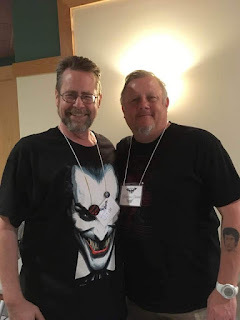
James L. Moore and Weston Ochse

Ray Garton
Recentlythree great writers and beloved members of the horror community passed away: WestonOchse, James A. Moore, and Ray Garton. Wes and Jim were both fifty-eight, twoyears younger than I am, and Ray was sixty-one, one year older. As I age, Ifeel increasingly like a glacier that periodically loses pieces of itself. Iendure, but I feel smaller. The deaths of fellow writers – those I knewpersonally and those who I knew only through their writing – always hit mehard. I was fortunate enough to sit next to William F. Nolan and DennisEtchison at a dinner in Las Vegas during the first StokerCon. Bill was in hisnineties, and at one point, he said the problem with being his age was that allhis family and friends were gone, as were the writers he started out with. I’vegot a while until I hit my nineties (if I make it that far), but I’m startingto feel what Bill was talking about.
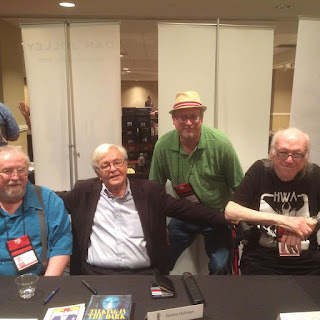
Steve Rasnic Tem, Dennis Etchison, some dumbass in a hat, William F. Nolan
Severalyears ago, I wrote a blog entry after horror author Paul Dale Anderson died. Init, I discussed what writers can do to combat the depression that comes withseeing other writers – mentors as well as contemporaries – die. You can read ithere: https://writinginthedarktw.blogspot.com/2018/12/suns-getting-low.html
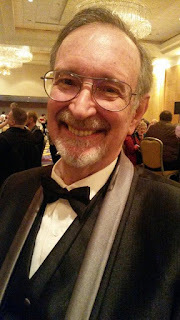
Paul Dale Anderson
Ididn’t know Wes and Jim as well as I would’ve liked. I saw both at variousconventions over the years and we talked, and we interacted online. Wes and Ishared the same agent, and he let me know that I was always welcome to visithim and Von (his wife, Yvonne Navarro) in Tucson. I wish I’d made the time to doso. Only a few months ago, Jim offered out of the blue to blurb my forthcomingshort story collection, Old Monsters Never Die. I knew he was strugglingwith his health, though, so I didn’t take him up on it. (I didn’t want him to expendenergy reading my book when he needed all the energy he could muster to heal.) Now I wish I had, if only so he would’ve knownhow much a blurb from him would’ve meant to me. I admired and respected Wes andJim – as writers, as positive presences in the horror community, and as humanbeings of great strength and grace who continued fighting until the end. I hopeI can find even a fraction of their courage when my time comes.
Inever met Ray in person, but we interacted online a number of times over the years.I read and enjoyed so many of his books, including the YA horror novels he wroteas Joseph Locke. I dedicated my 2015 YA horror novel Dark Art to him.
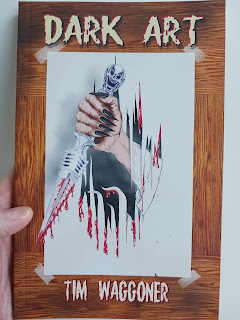

WhenI told him of the dedication via Facebook Messenger (and offered to send him acopy of the book), he wrote back:
“Wow,Tim, that is such a huge honor. Thankyou so much. I CAN'T WAIT to read it!”
Iwas like, Holy shit! Ray Garton thinks my dedication is an honor?
Raywas kind enough to contribute a mini-interview to Writing in the Dark: TheWorkbook. Here it is:
RayGarton, author of Live Girls
Whenyou write horror fiction—and I suppose the same is true of fantasy and, to acertain extent, some science fiction—you’re writing about things that existoutside of reality, that are not a part of everyday human experience. As I seeit, my first job is to make them a part of reality, of everyday humanexperience. Some will advise you to create the suspension of disbelief in yourreaders. That’ll work in a pinch, but I prefer to pass suspension and gostraight for outright belief, always with varying degrees of success, Isuspect. I try to weave the supernatural element so tightly into everyday humanexperience that the two can’t be separated. That usually involves building upthe human part first, and once my characters are established, I insert the supernaturalelement, whether it’s a vampire, a werewolf, a ghost—whatever it is. By thattime, I hope I have engaged the readers and gained their faith, which helps alot when I add the supernatural stuff. By now, my readers know the charactersand are, if I’ve done my job, involved in their lives, and they care about whathappens to them. Then I make those characters suffer with the supernatural.
Anystory that has a supernatural element needs a set of rules for that element tofollow, and those rules must be diligently observed. A supernatural storywithout those rules is a cheat to the reader, I think, because you’re free todo whatever you want whenever you want to do it, which doesn’t always makesense as a story. You have to slip the rules into the proceedings in a way thatdoesn’t feel like a list: “You may be a werewolf IF …” followed by severalsigns of lycanthropy. Insert those rules in a way that the reader doesn’tnotice. Yeah, I know, easier said than done. Once they’re in, you must followthem. Setting up rules and then violating them is just as much of a cheat tothe readers as having no rules at all. But there’s a narrow sweet spot betweenthe two, and that’s your goal.
Ifyou’re a writer who’s been contemplating your mortality lately, and youhaven’t established an author will yet, I wrote a blog entry about that too: https://writinginthedarktw.blogspot.com/2023/08/the-things-we-leave-behind.html
Overthe last couple years, I’ve noticed younger writers who either have never heardof some of the horror luminaries who are no longer with us, or who’ve neverread their work. Writers tend to read their contemporaries as well as writersthey’ve made connections with via social media and at various events. It’s onlynatural. But I urge you not to forget those writers who’ve passed away. Notonly can you learn a lot from them, by reading their work, you help keep themalive. Here are links to the bibliographies of the authors I mentioned above:
WestonOchse: https://www.fantasticfiction.com/o/weston-ochse/
JamesA. Moore: https://www.fantasticfiction.com/m/james-a-moore/
RayGarton: https://www.fantasticfiction.com/g/ray-garton/
WilliamF. Nolan: https://www.fantasticfiction.com/n/william-f-nolan/
DennisEtchison: https://www.fantasticfiction.com/e/dennis-etchison/
PaulDale Anderson: https://www.fantasticfiction.com/a/paul-dale-anderson/
Followingis a list of other horror writers who’ve left us within the last few decades. Youcan learn about their work on the Fantastic Fiction website, too: https://www.fantasticfiction.com/
Everysingle one of these authors is well worth your time and attention.
RobertAickman
JonathanAycliffe
WilliamPeter Blatty
RobertBloch
CharlesBeumont
RayBradbury
GaryBrandner
HughB. Cave
BasilCopper
LesDaniels
HarlanEllison
J.F.Gonzalez
EdGorman
CharlesL. Grant
RickHautala
JamesHerbert
CharleeJacob
RubyJean Jensen
JackKetchum
JoelLane
RichardLaymon
TanithLee
BrianLumley
RichardMatheson
MichaelMcDowell
BrianMcNaughton
JoeMcKinney
RexMiller
A.R.Morlan
JohnPelan
ThomasPiccirilli
W.H.Pugmire
AnneRice
AlanRodgers
MarkSamuels
MichaelShea
GuyN. Smith
PeterStraub
MelanieTem
KarlEdward Wagner
RobertWeinberg
JayWilburn
J.N.Williamson
GahanWilson
RockyWood
T.M.Wright
Ifthere are any horror authors I’ve omitted, feel free to add their names in thecomments section.



